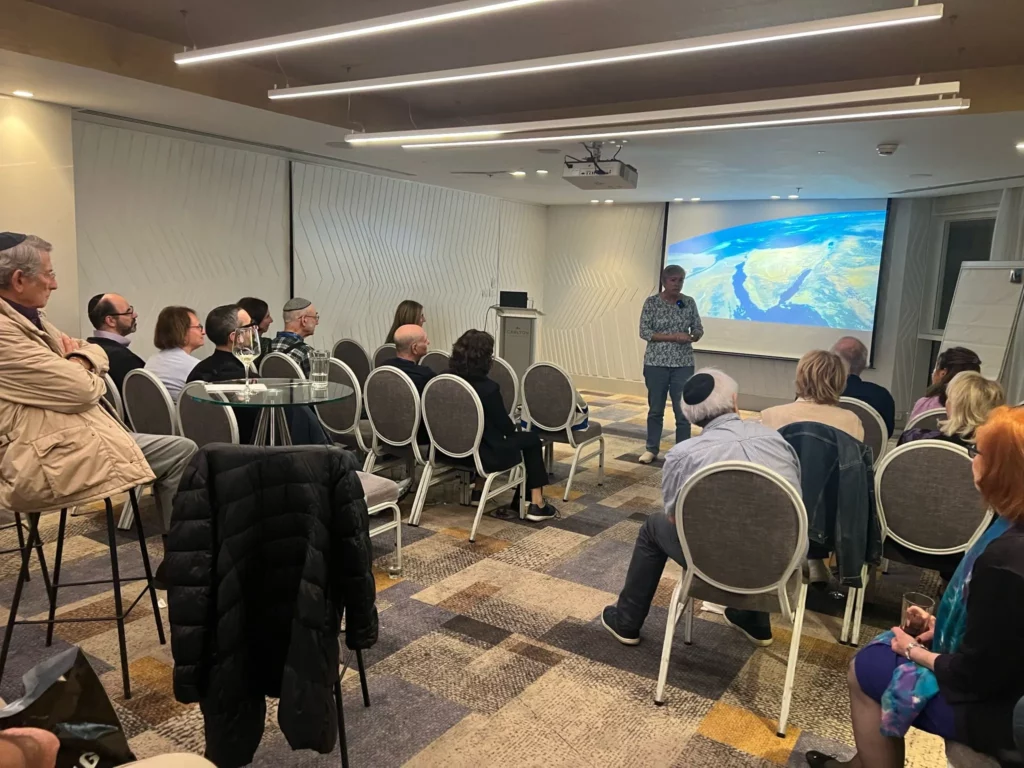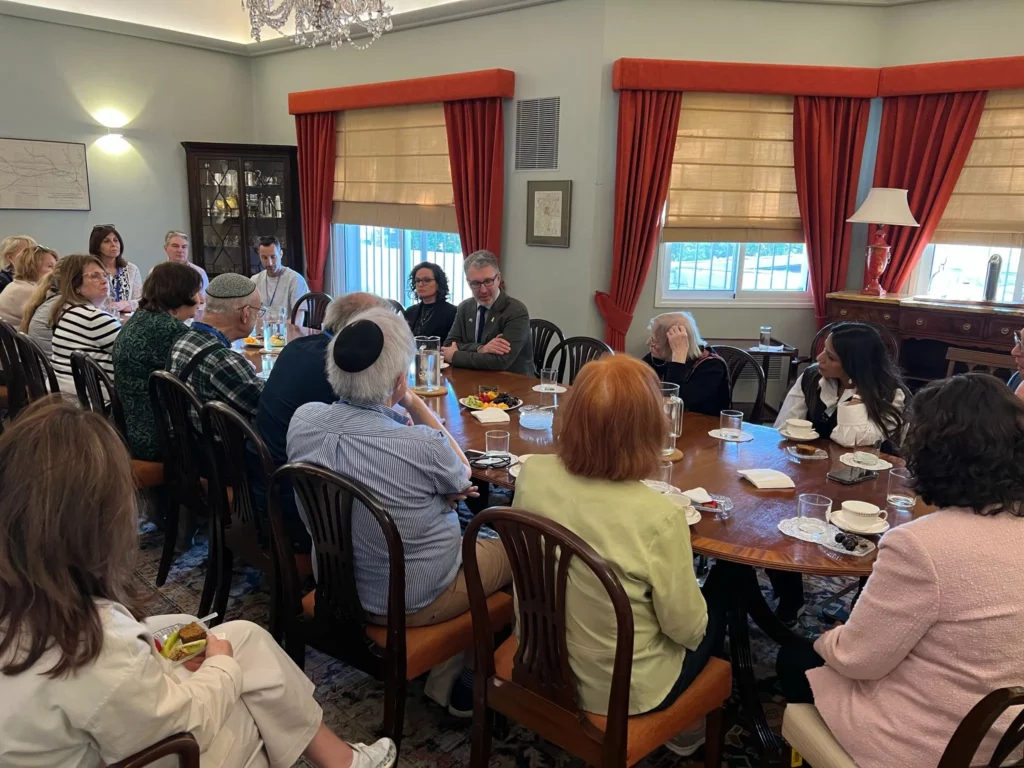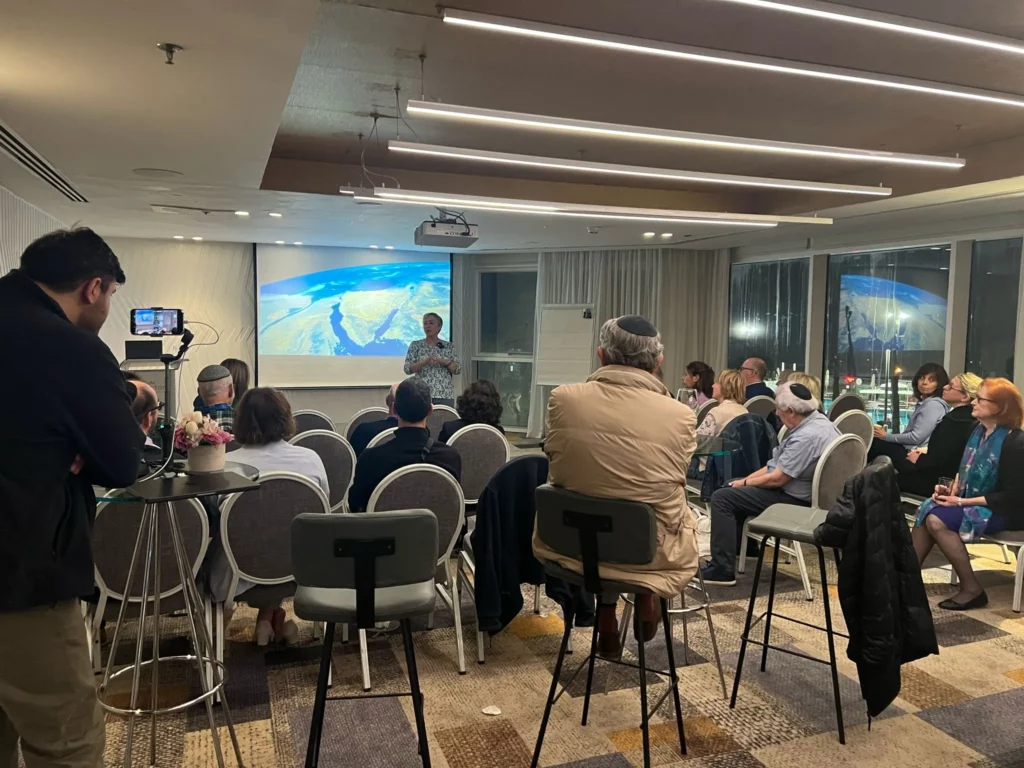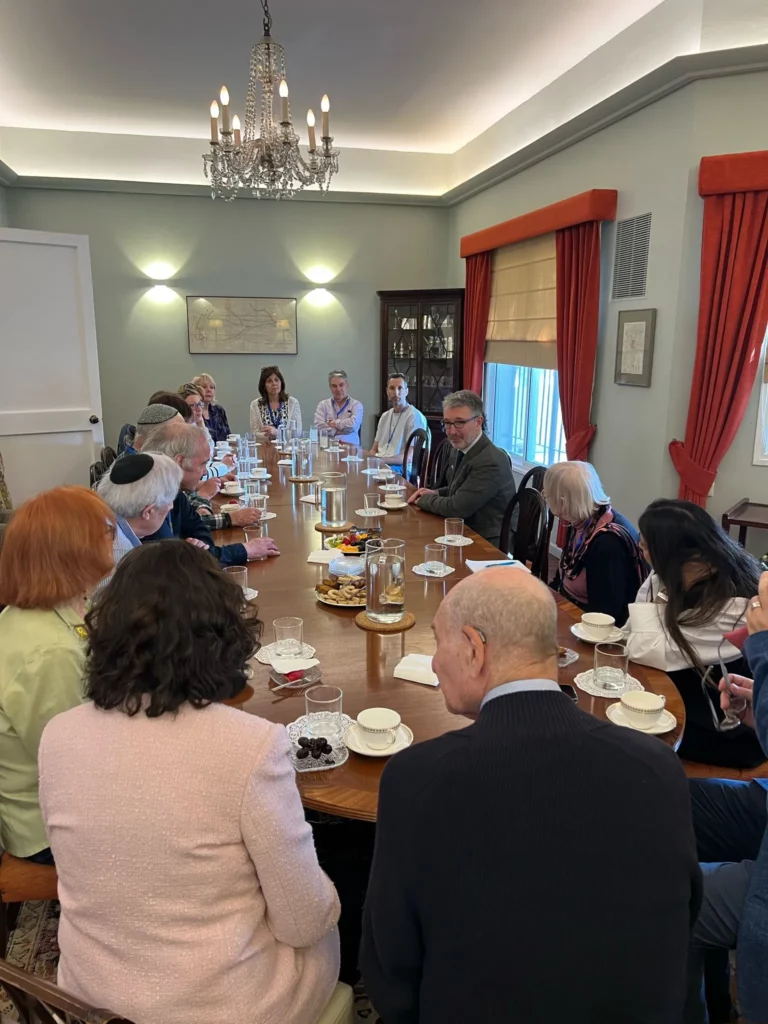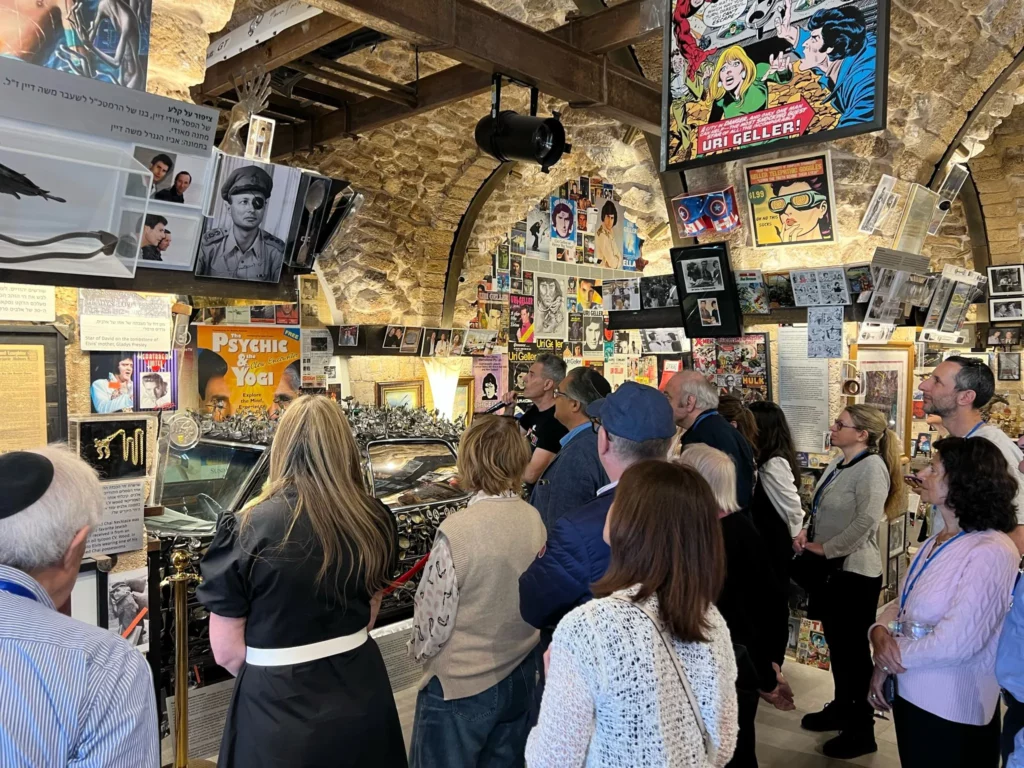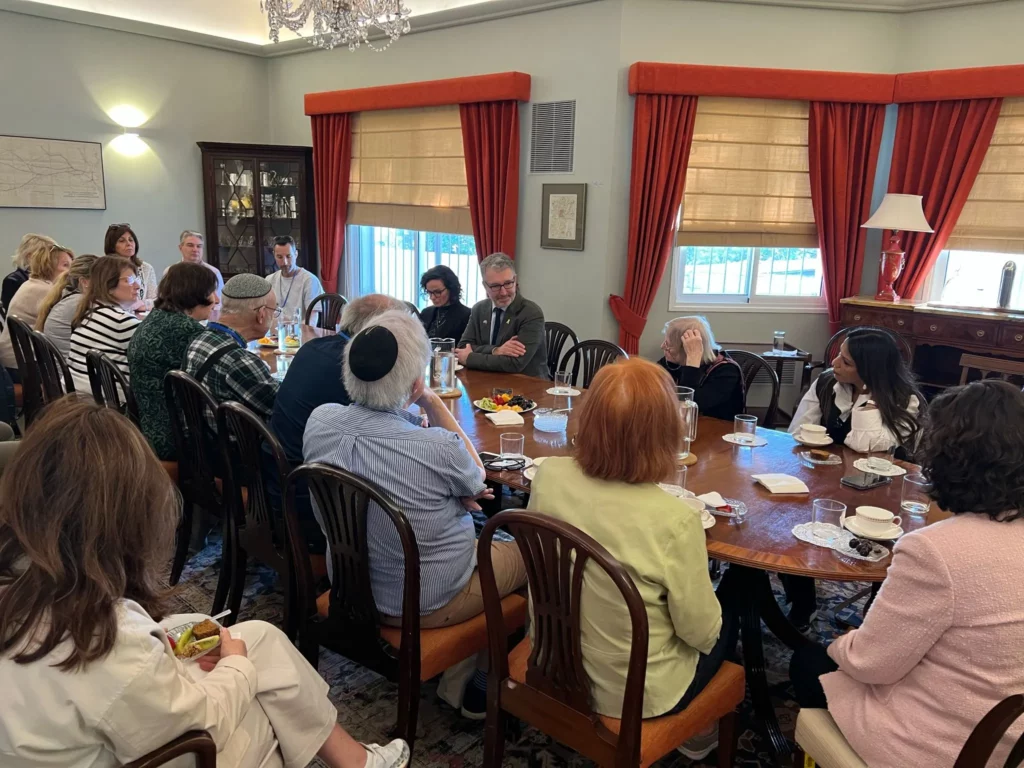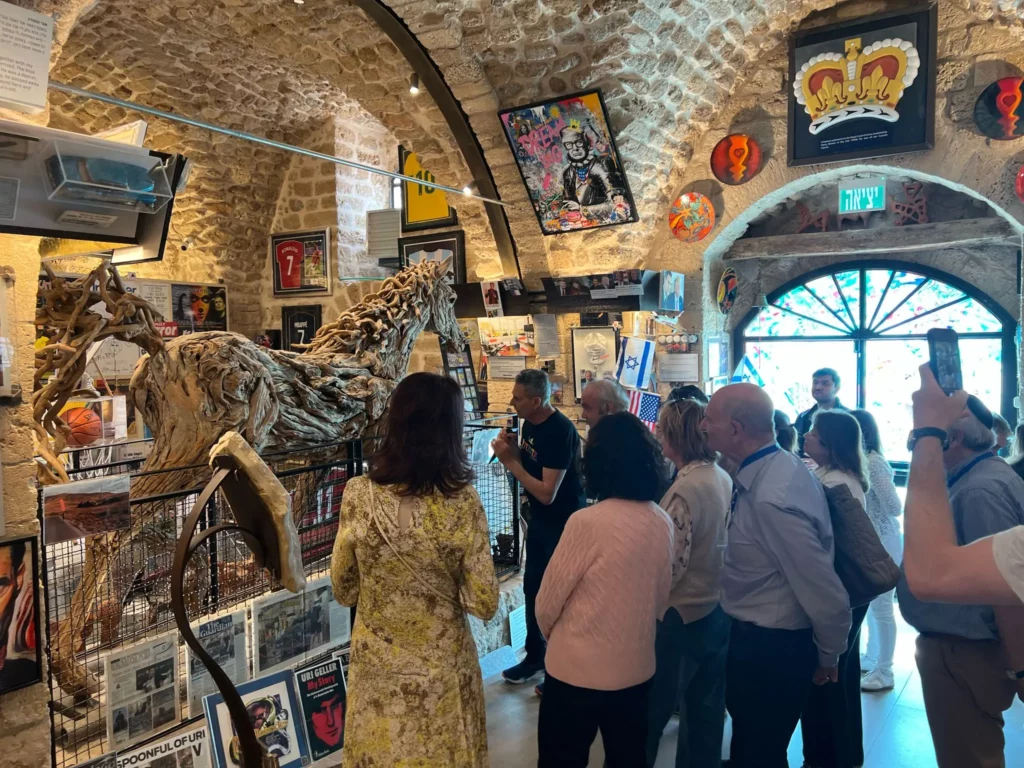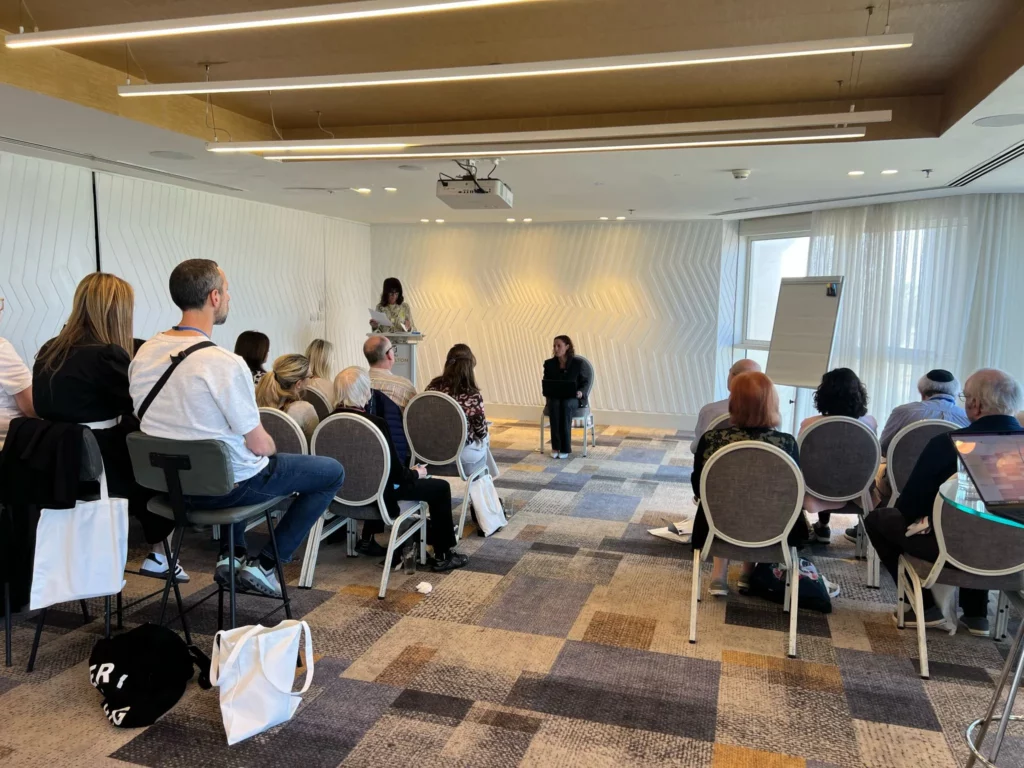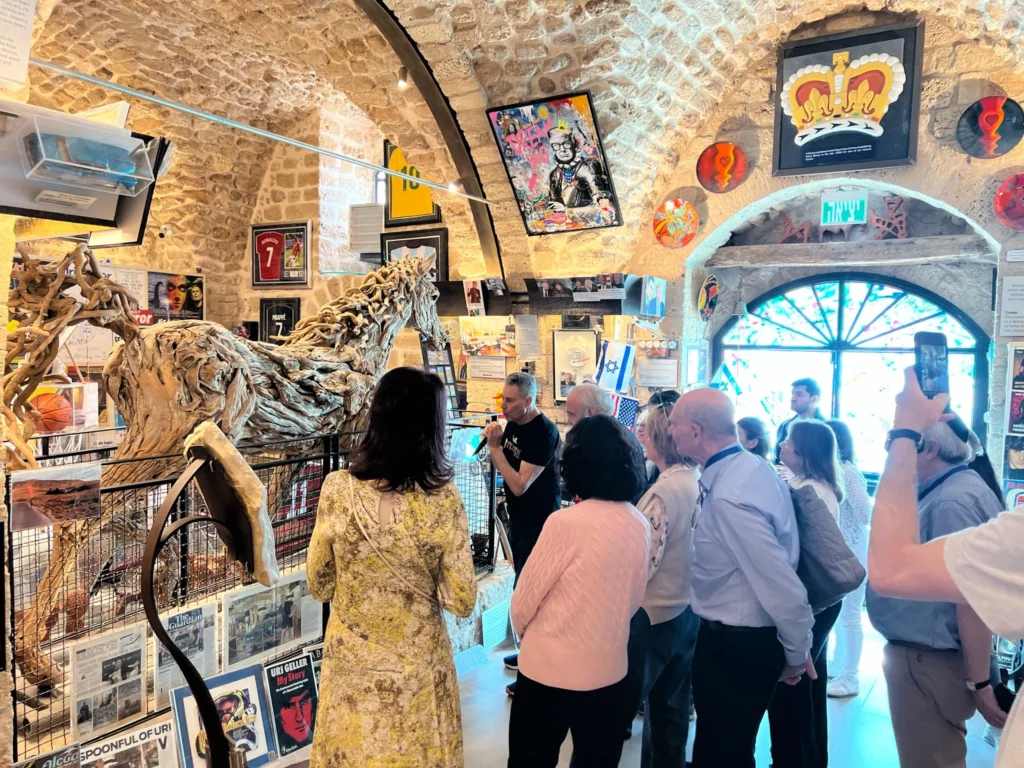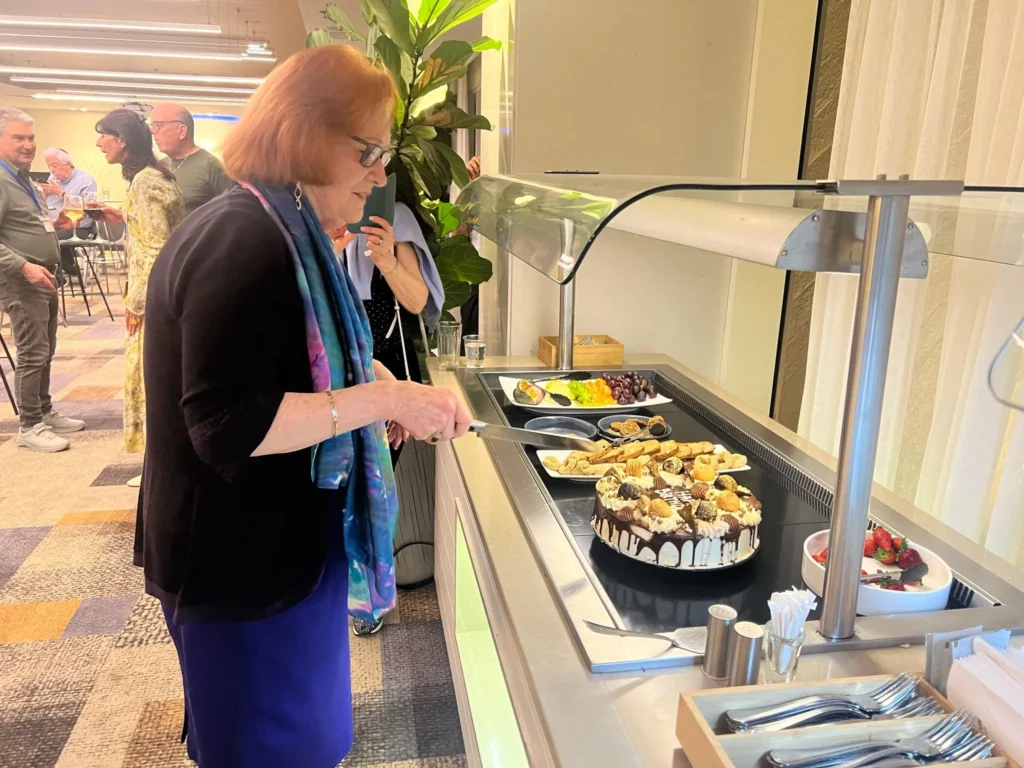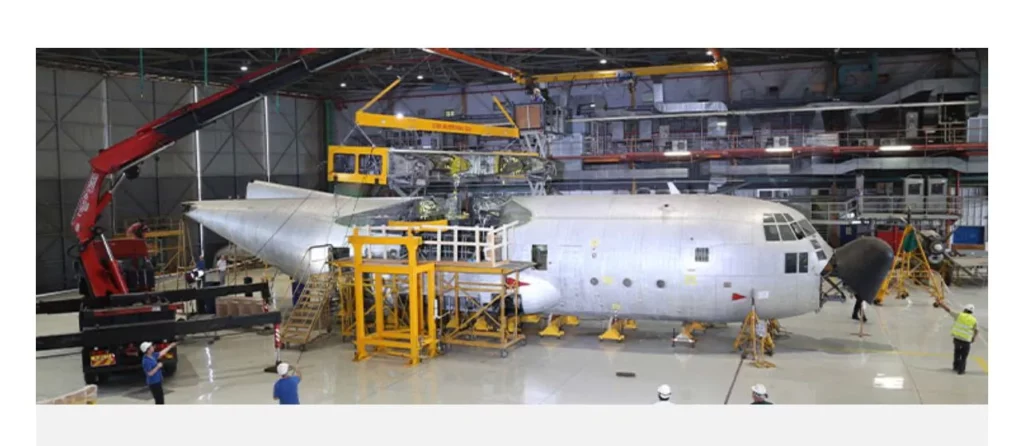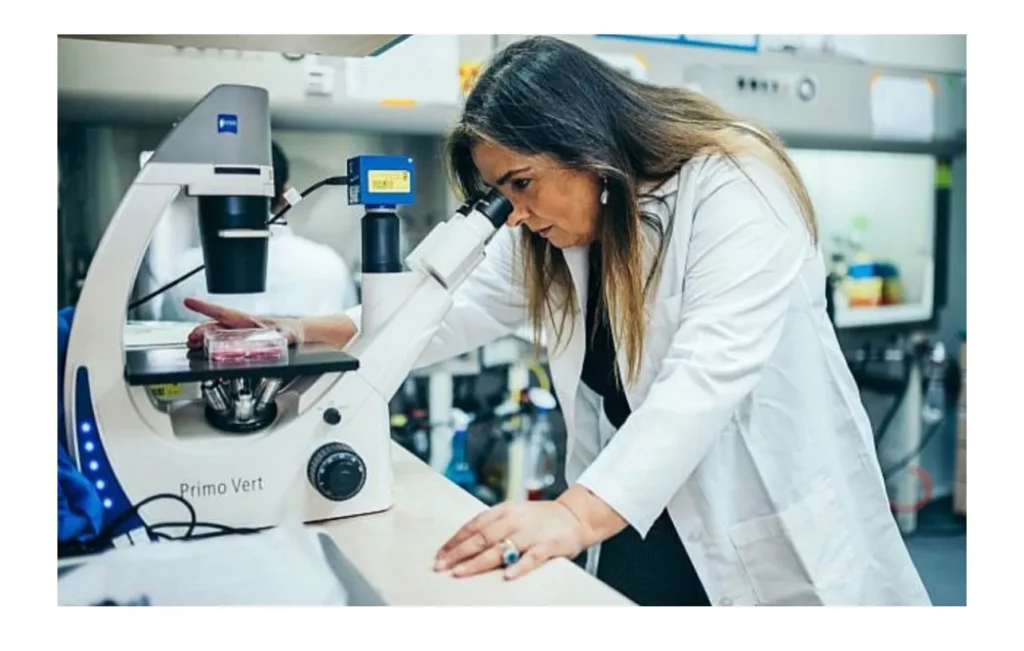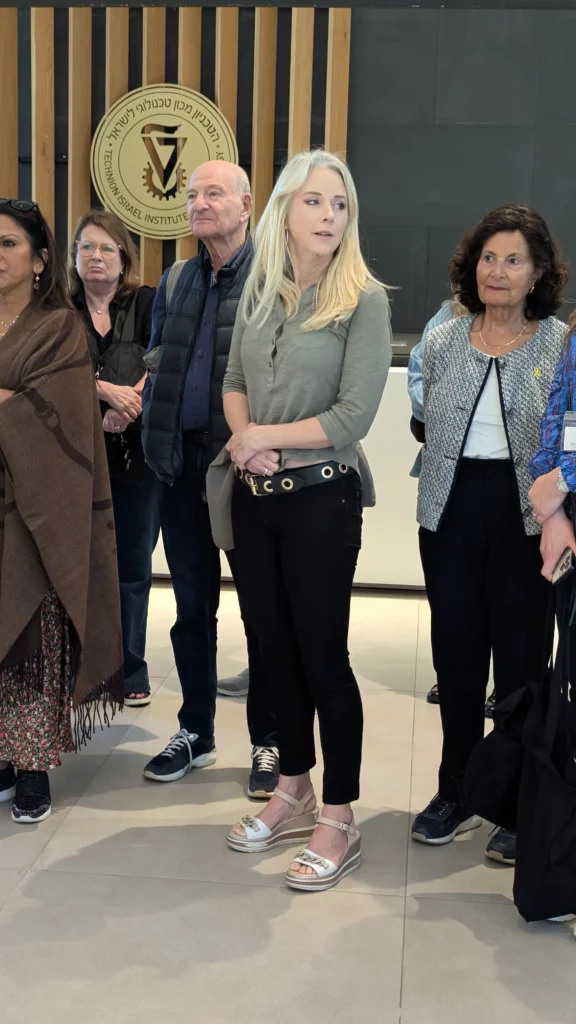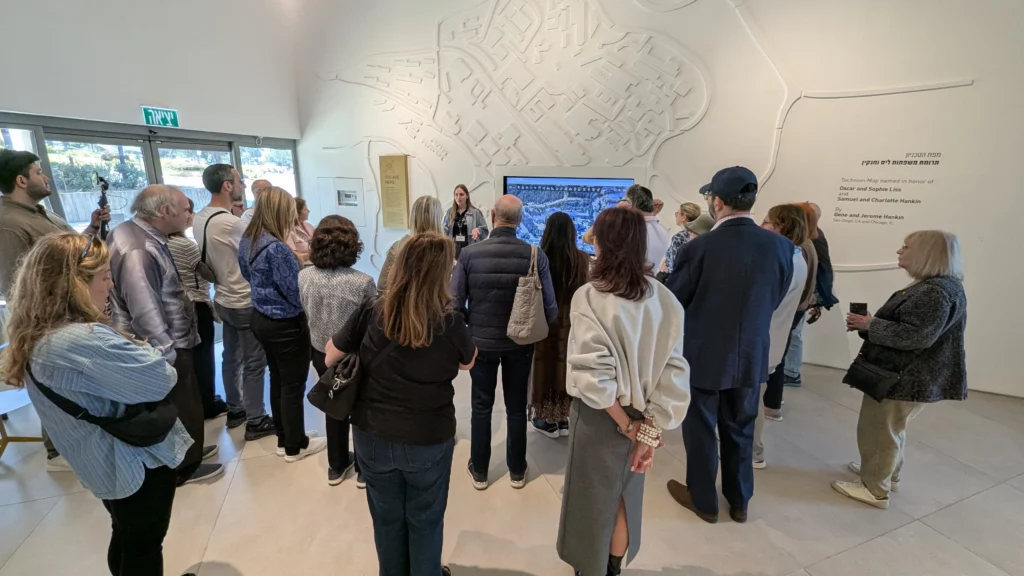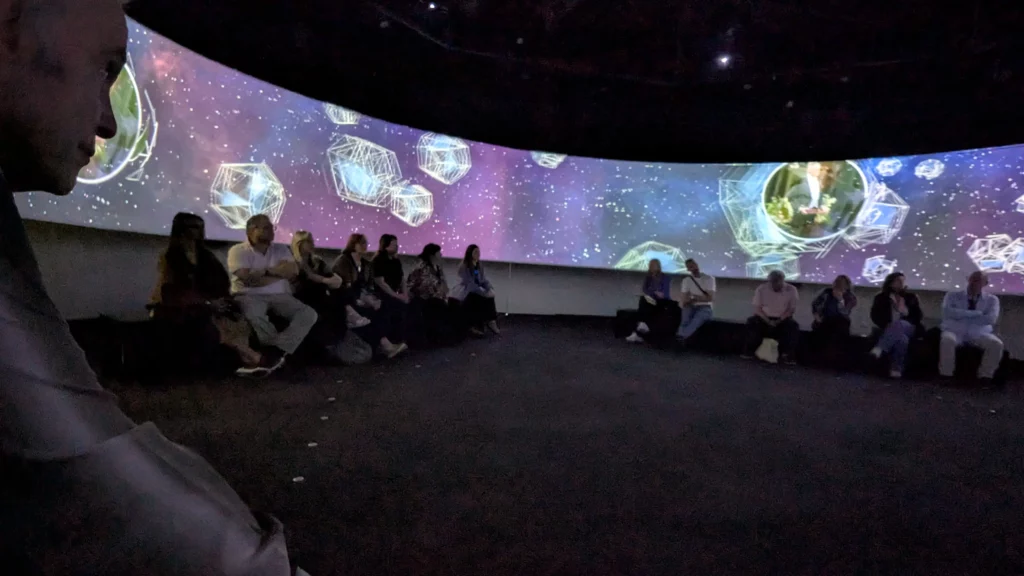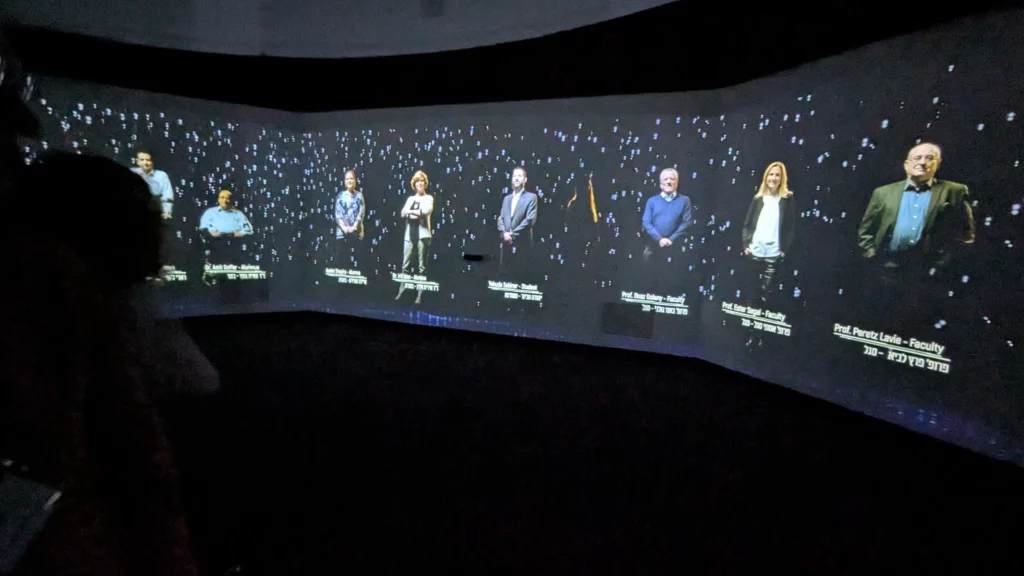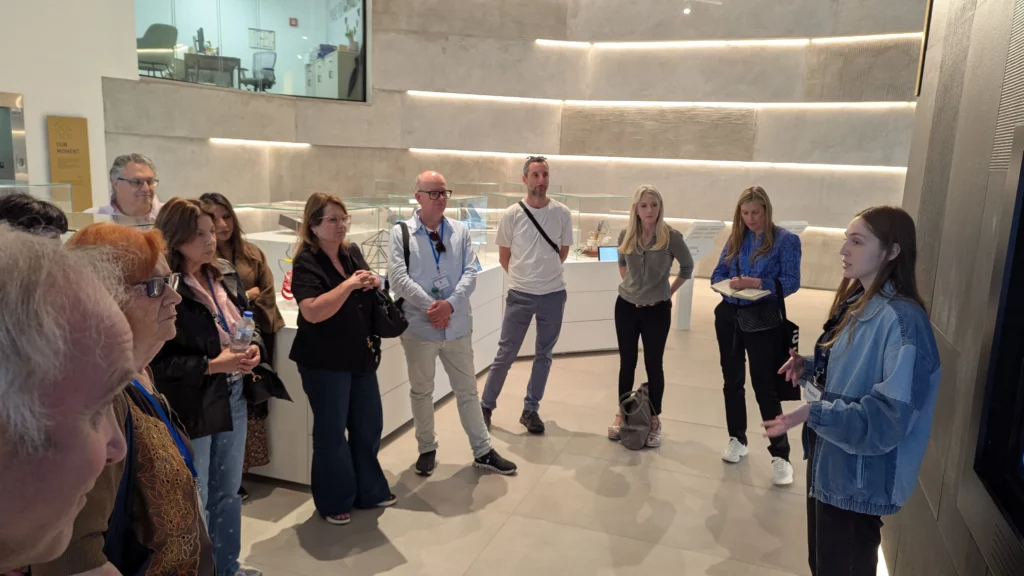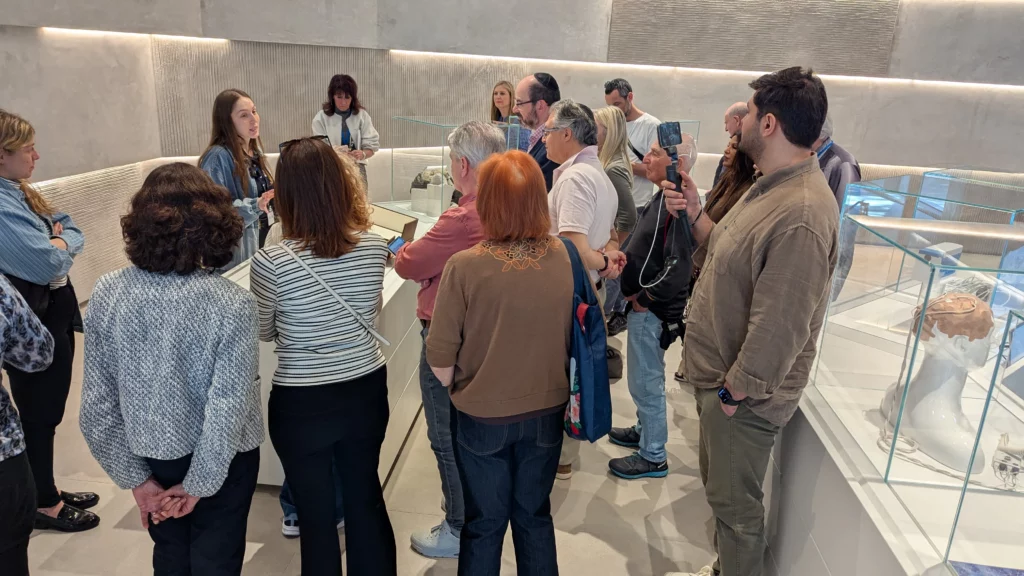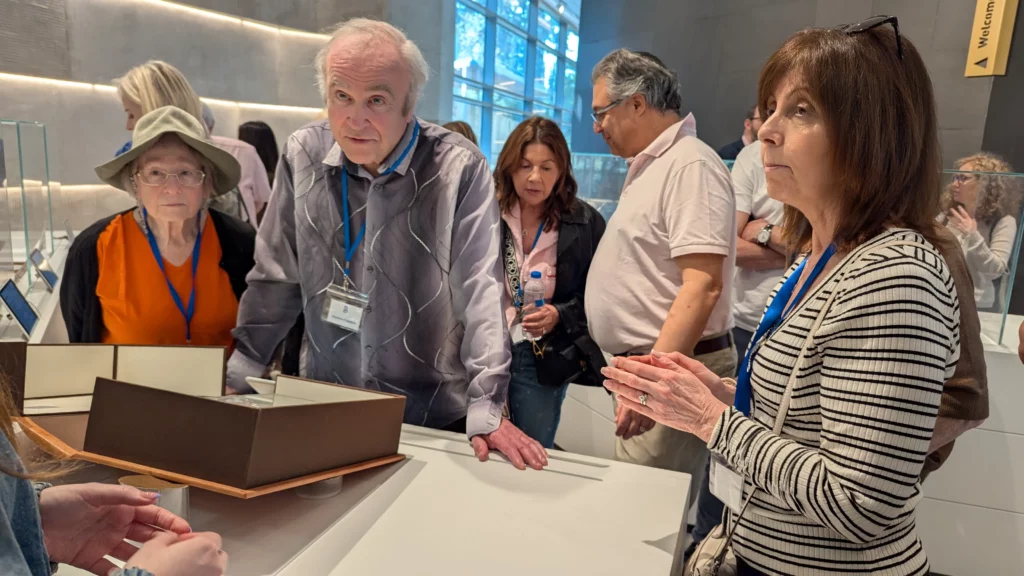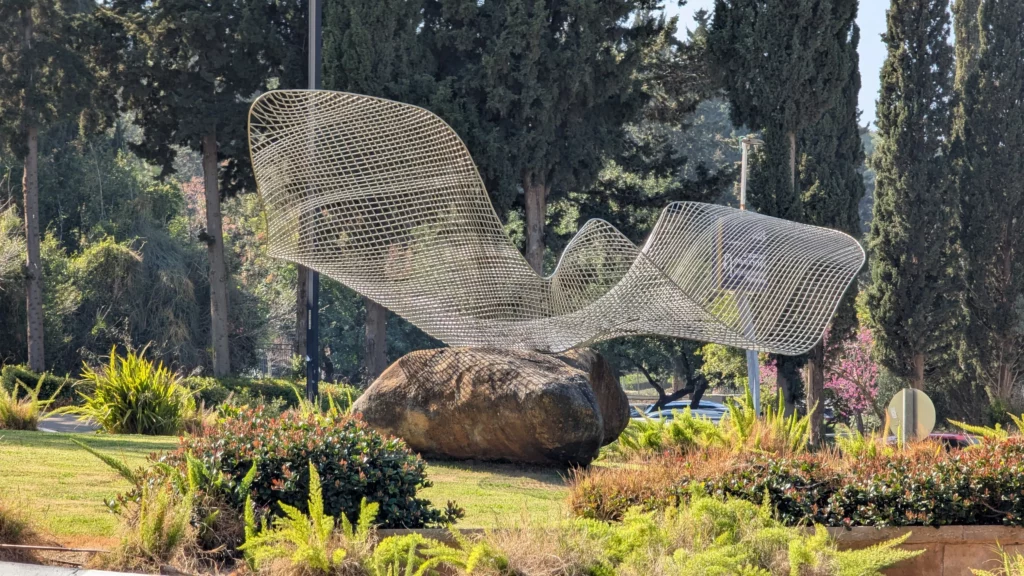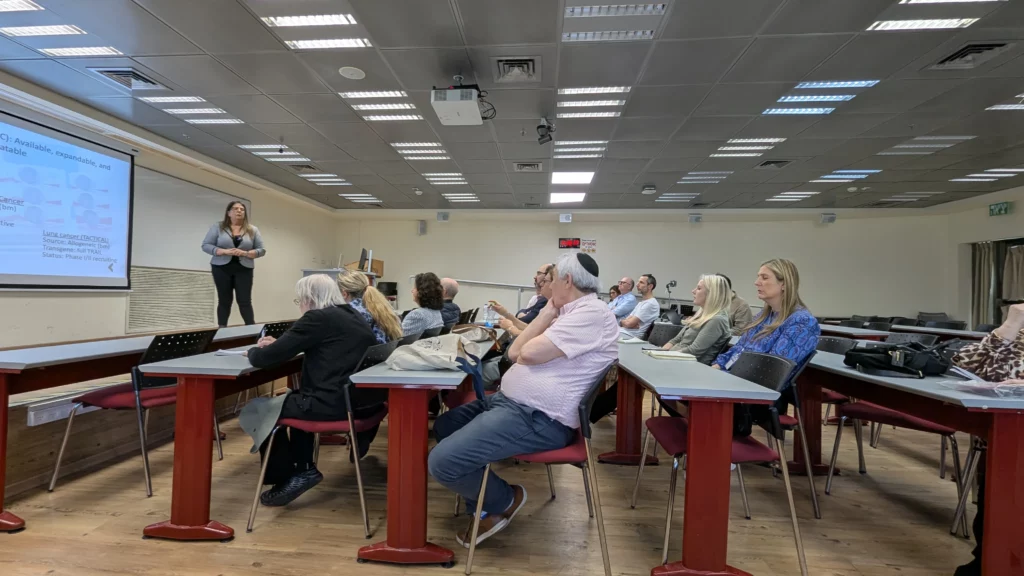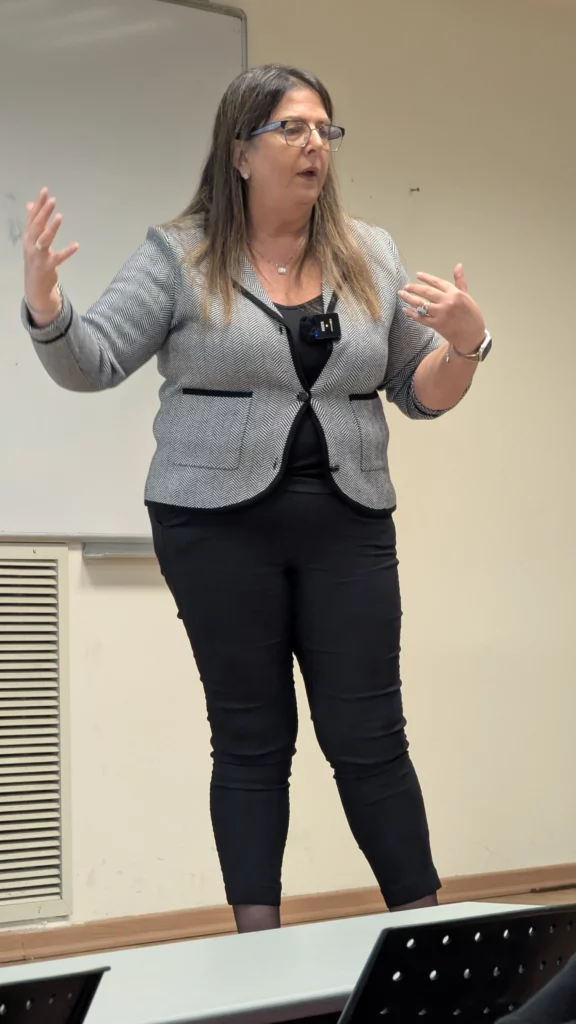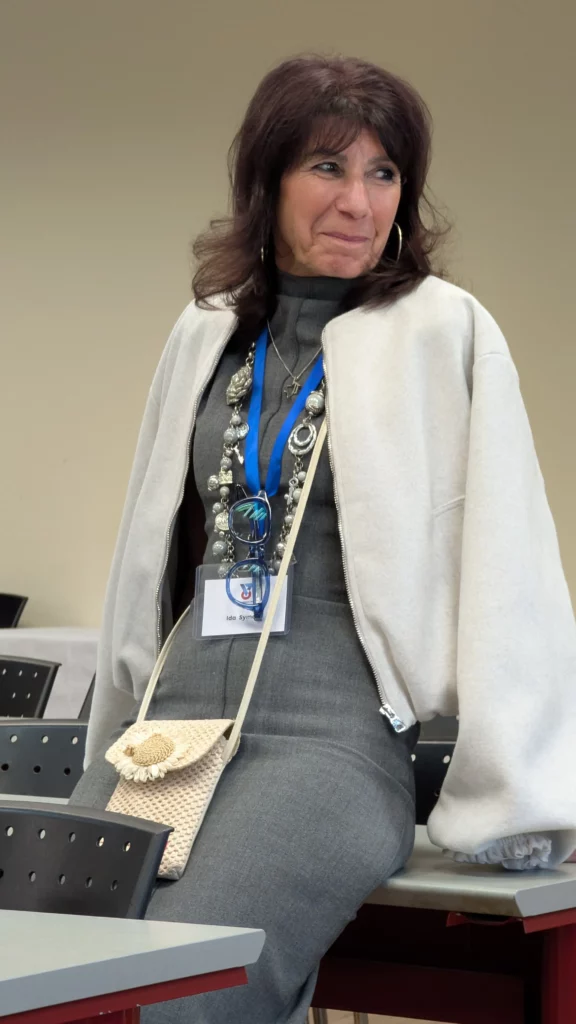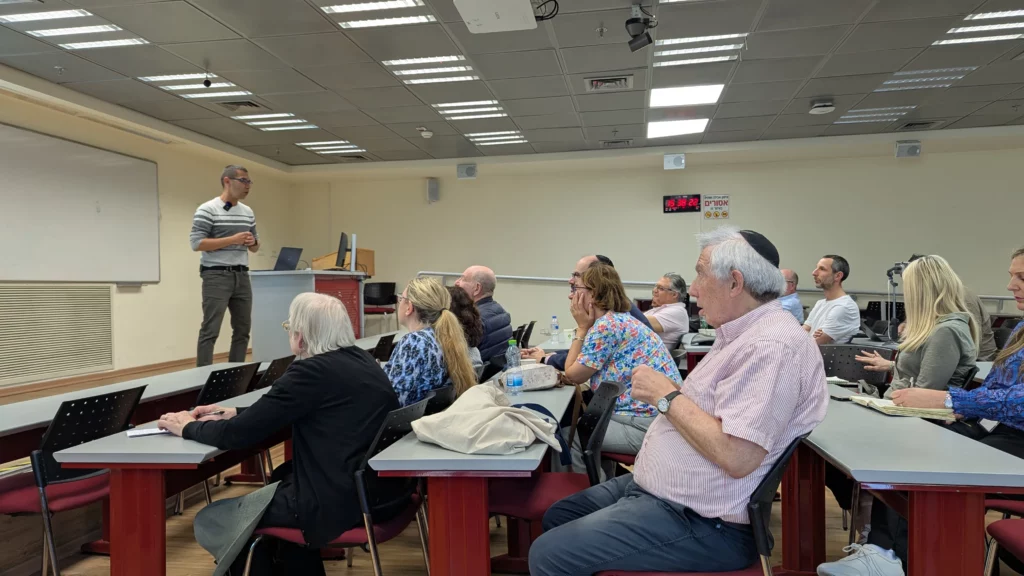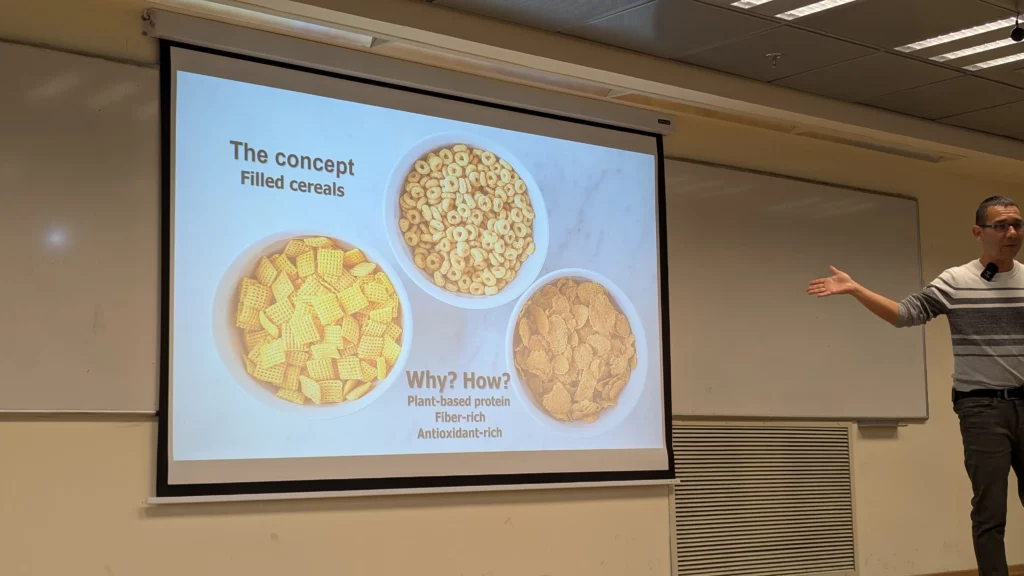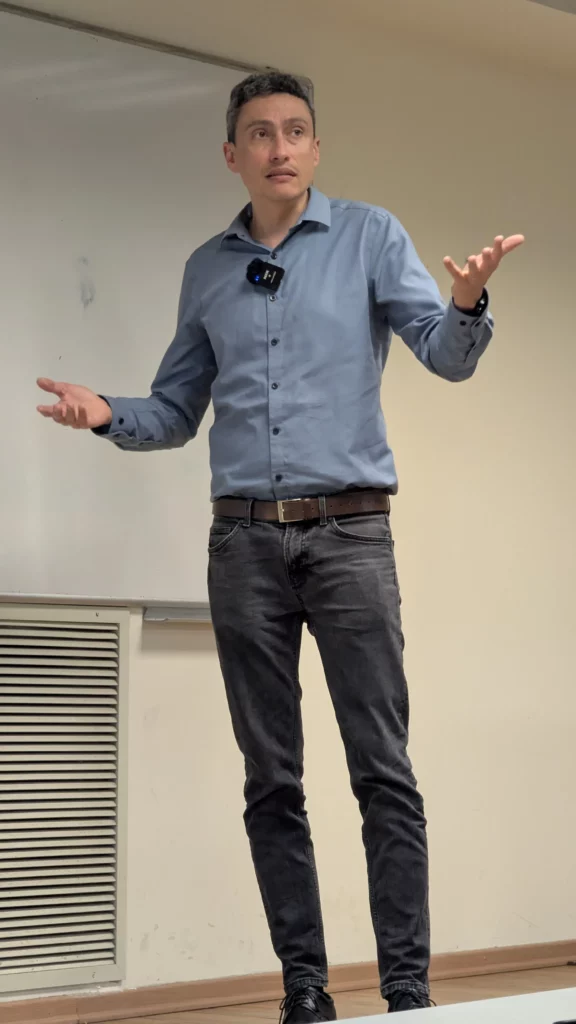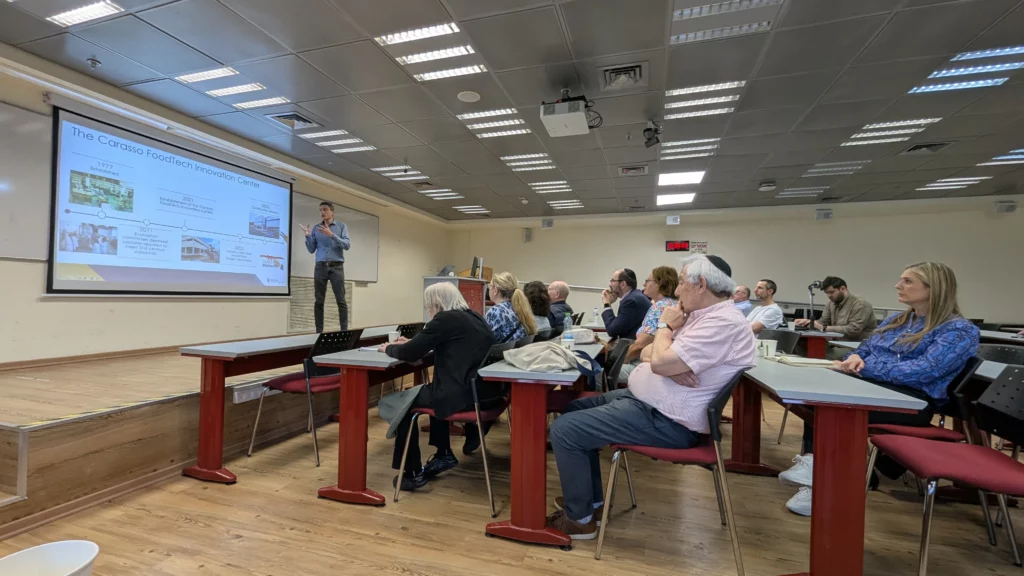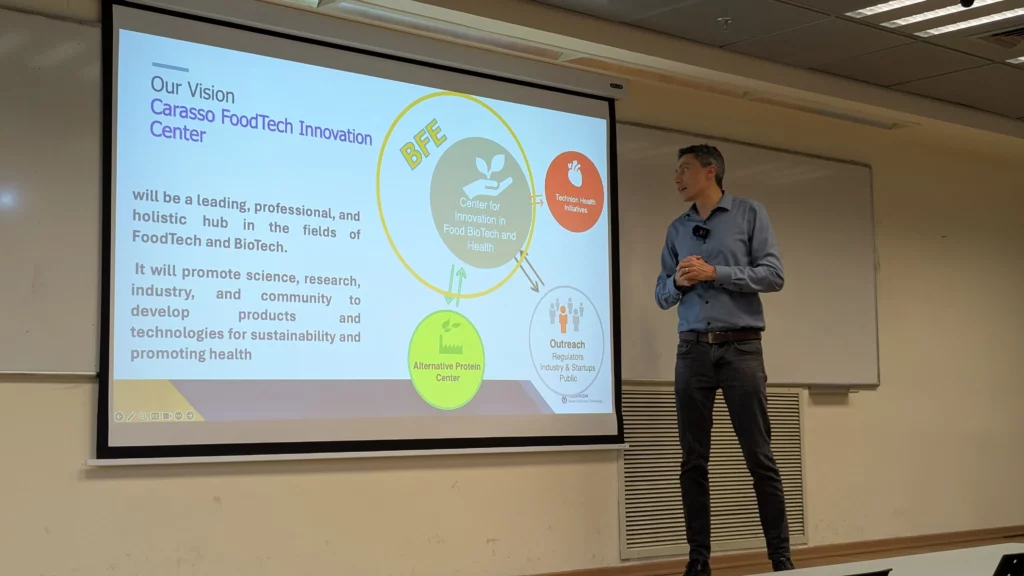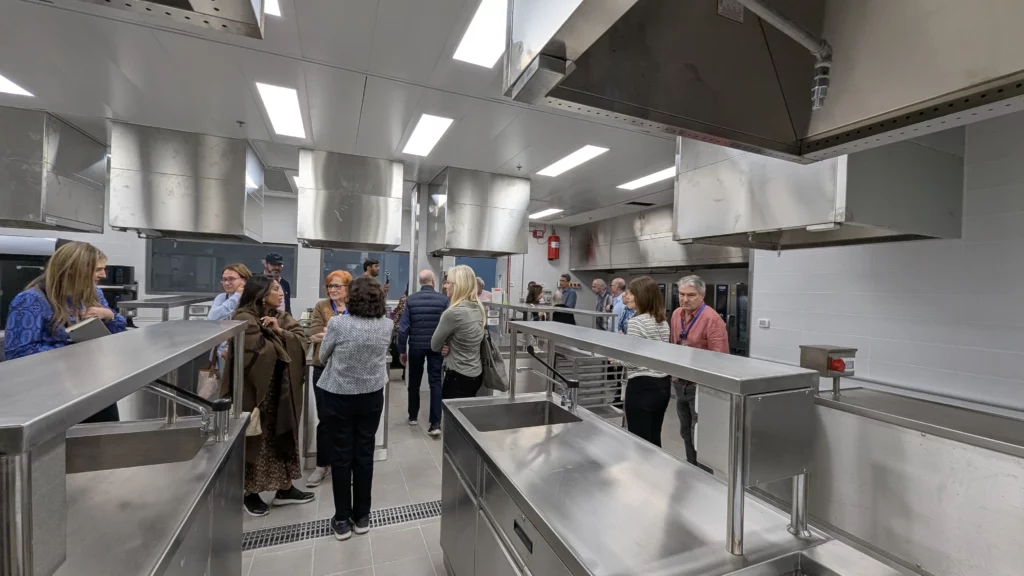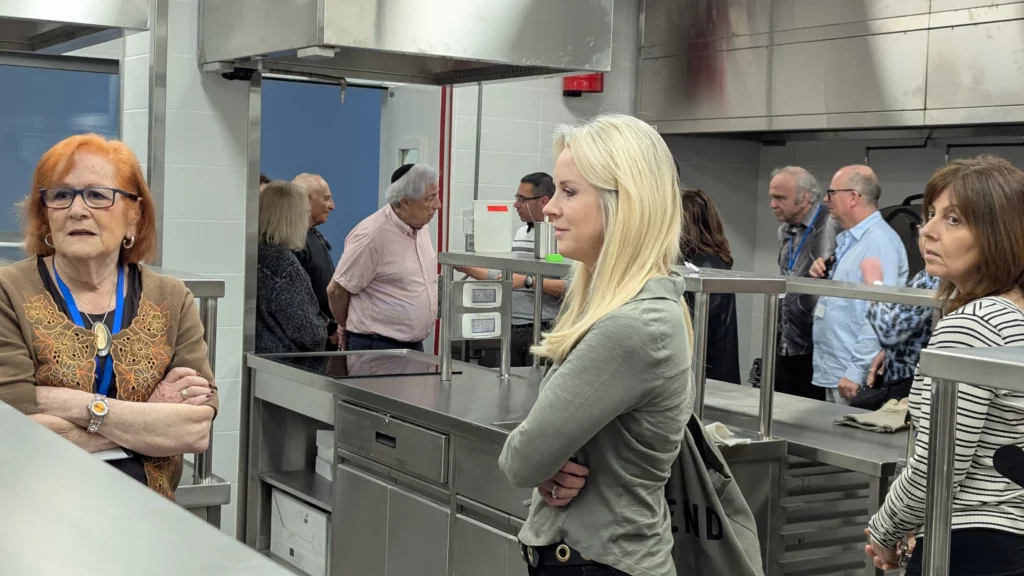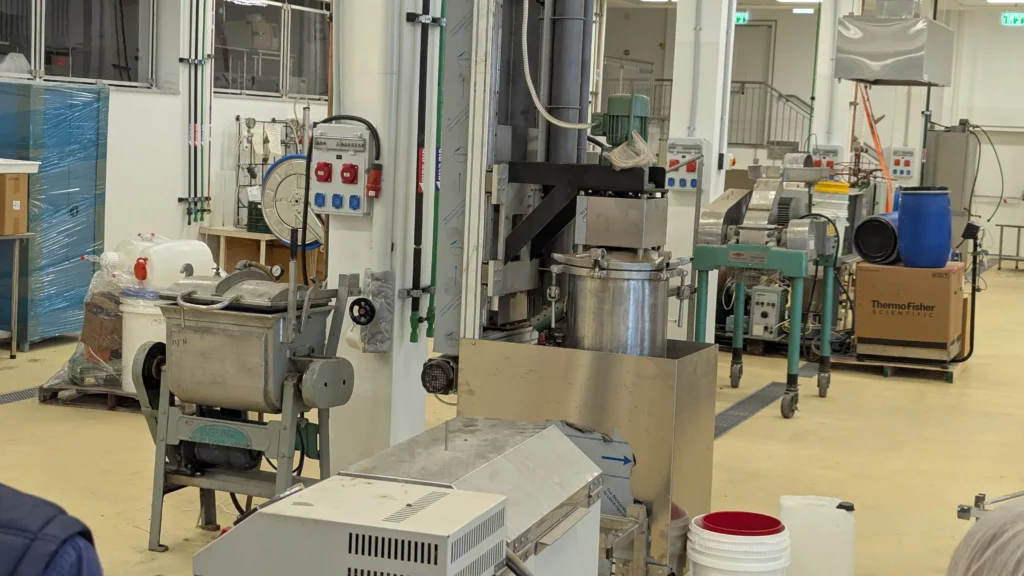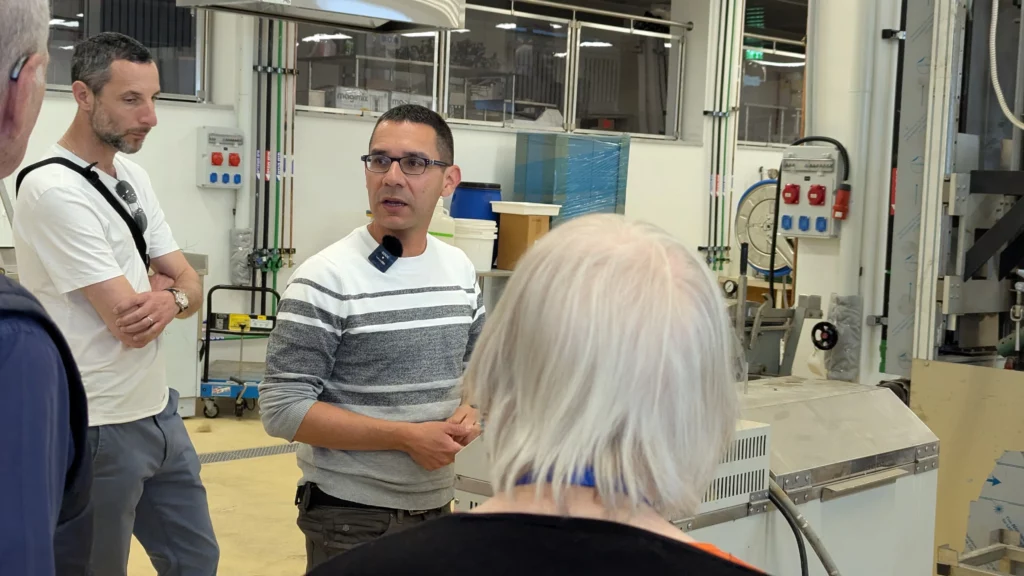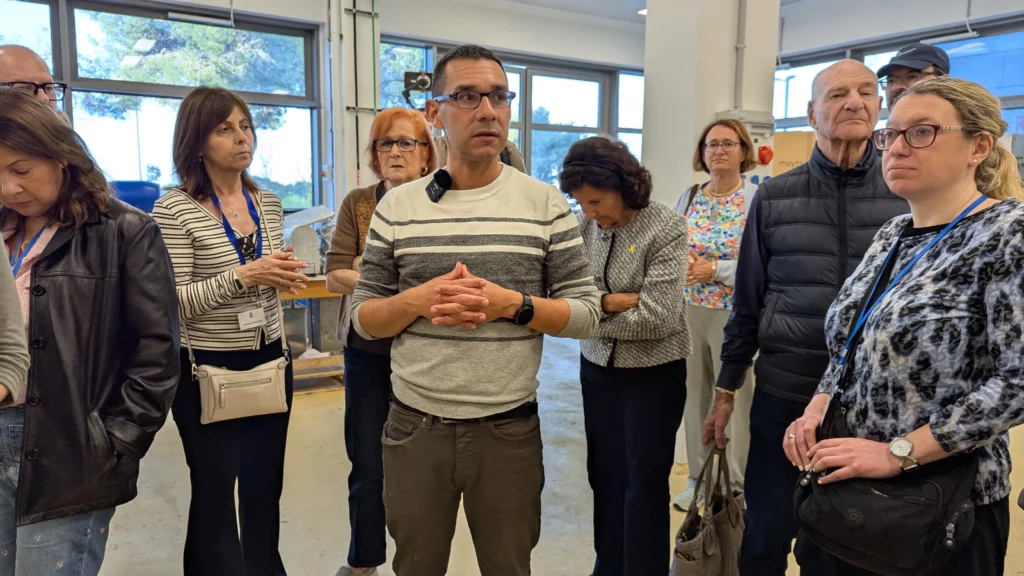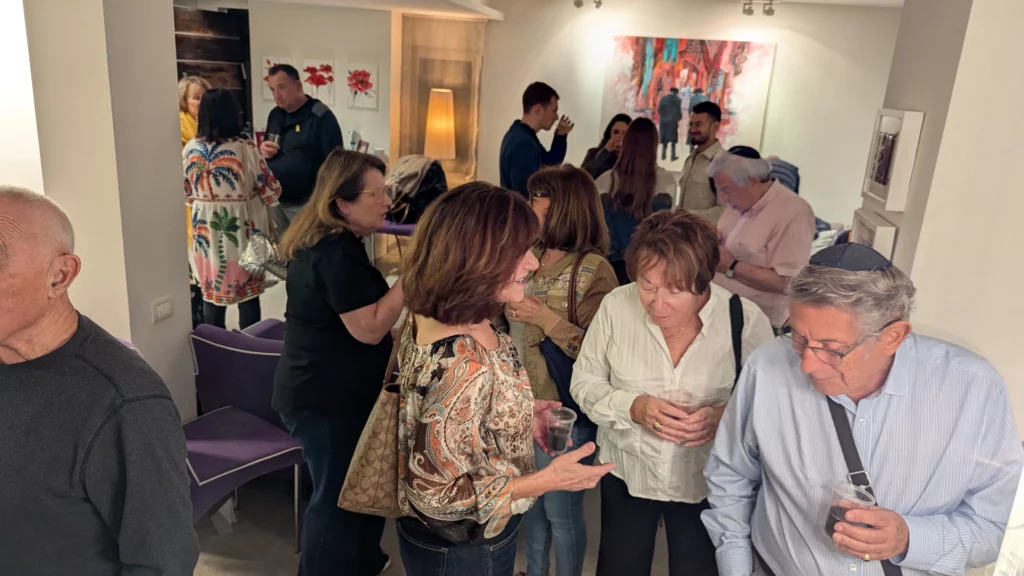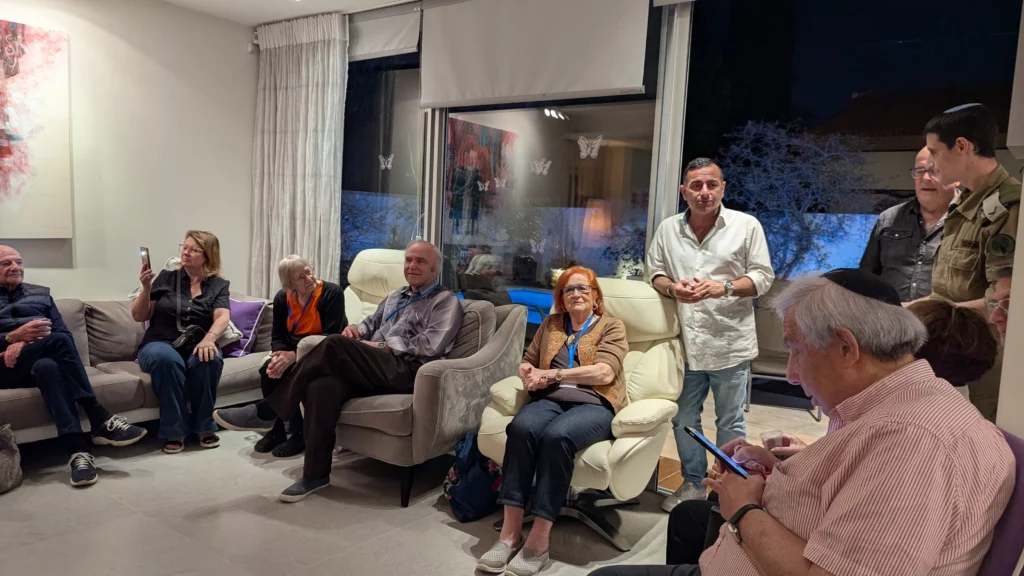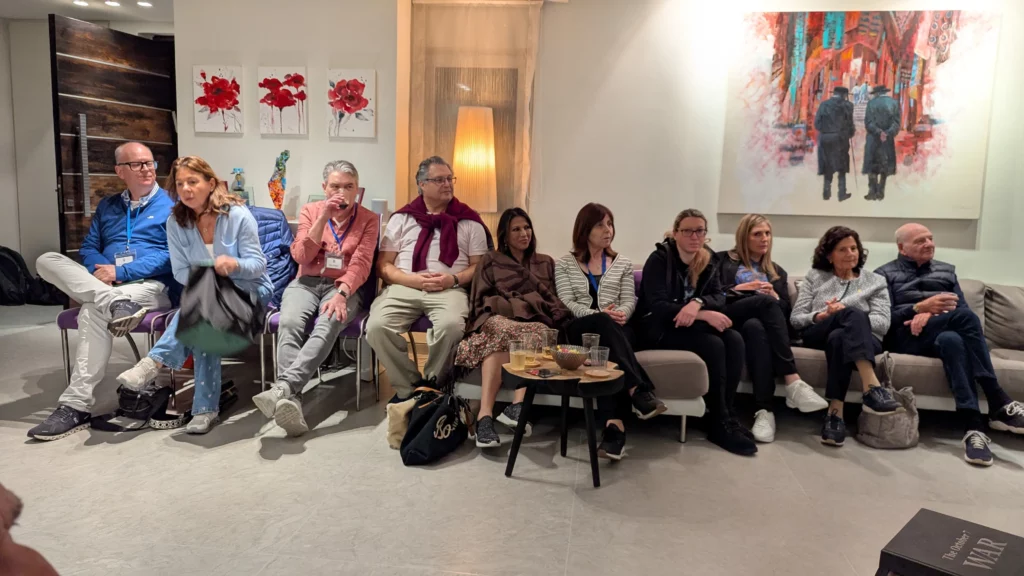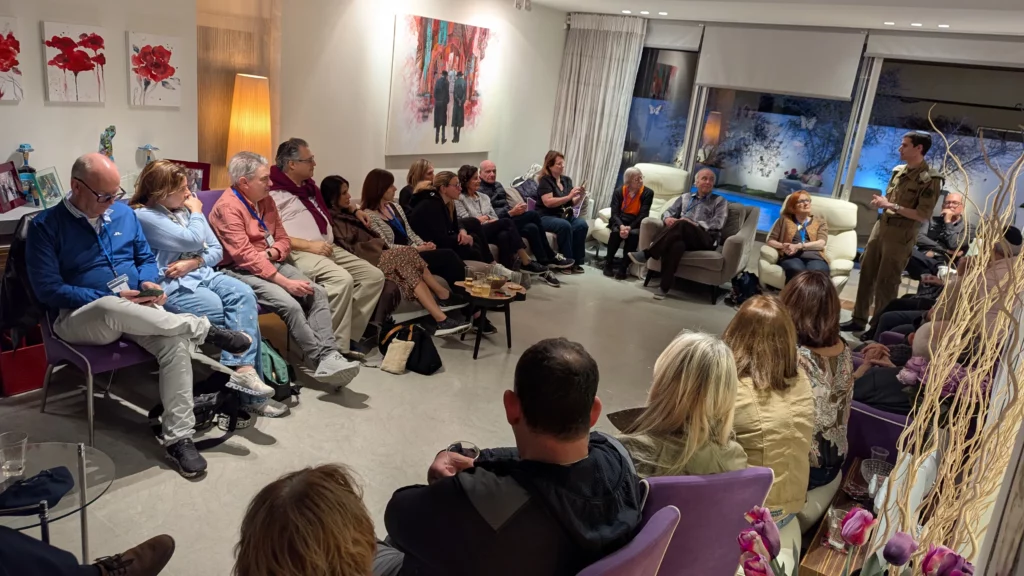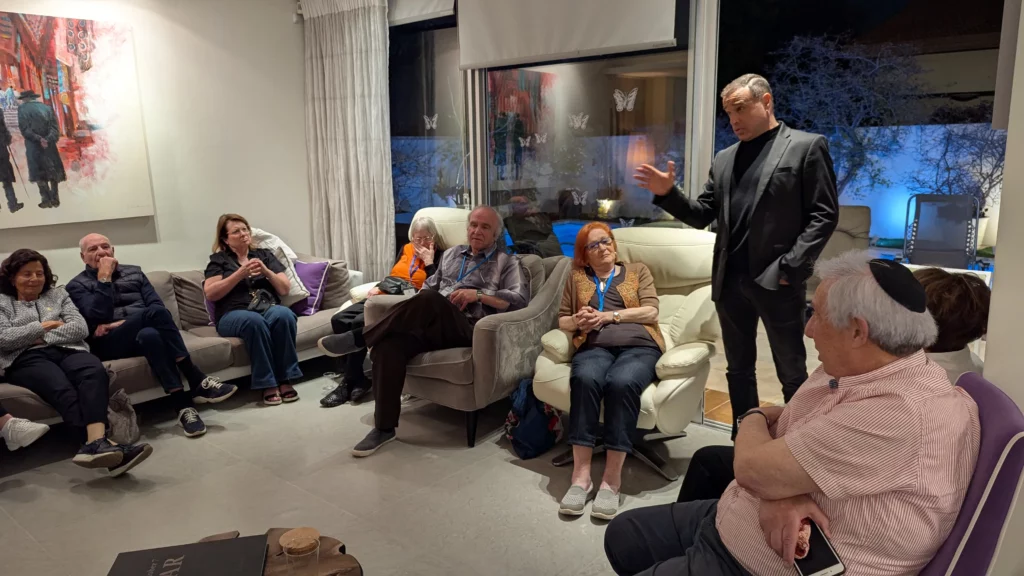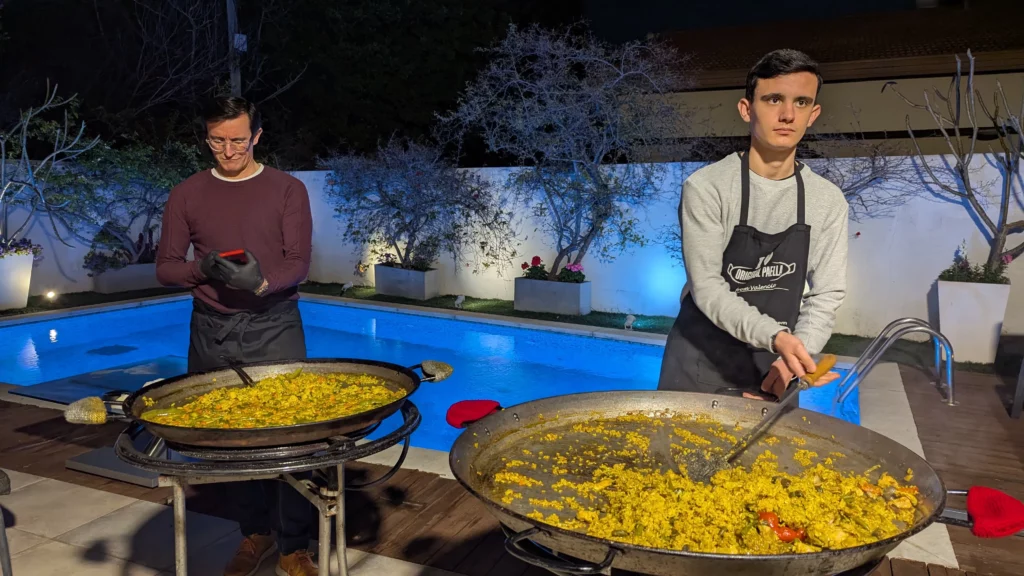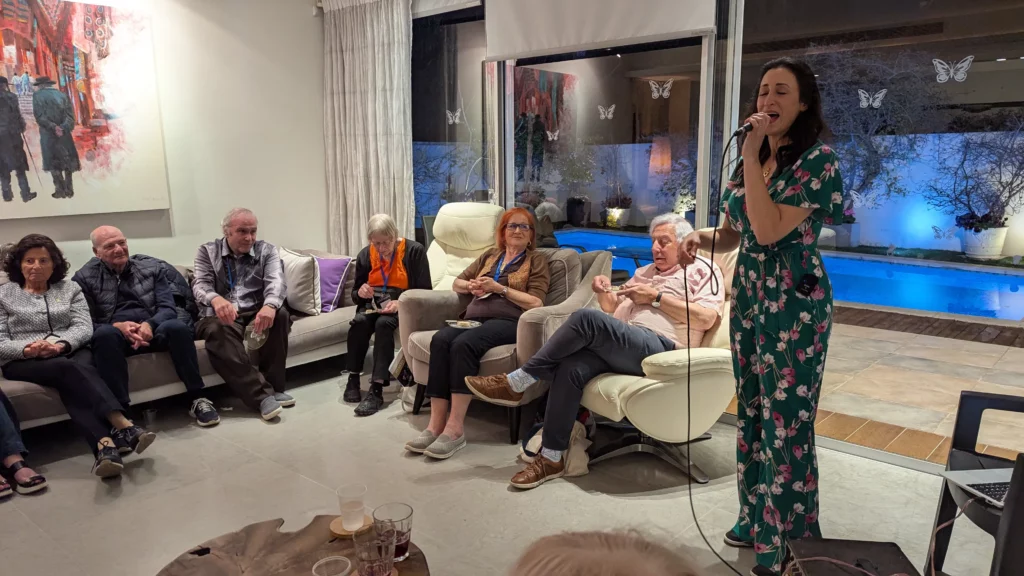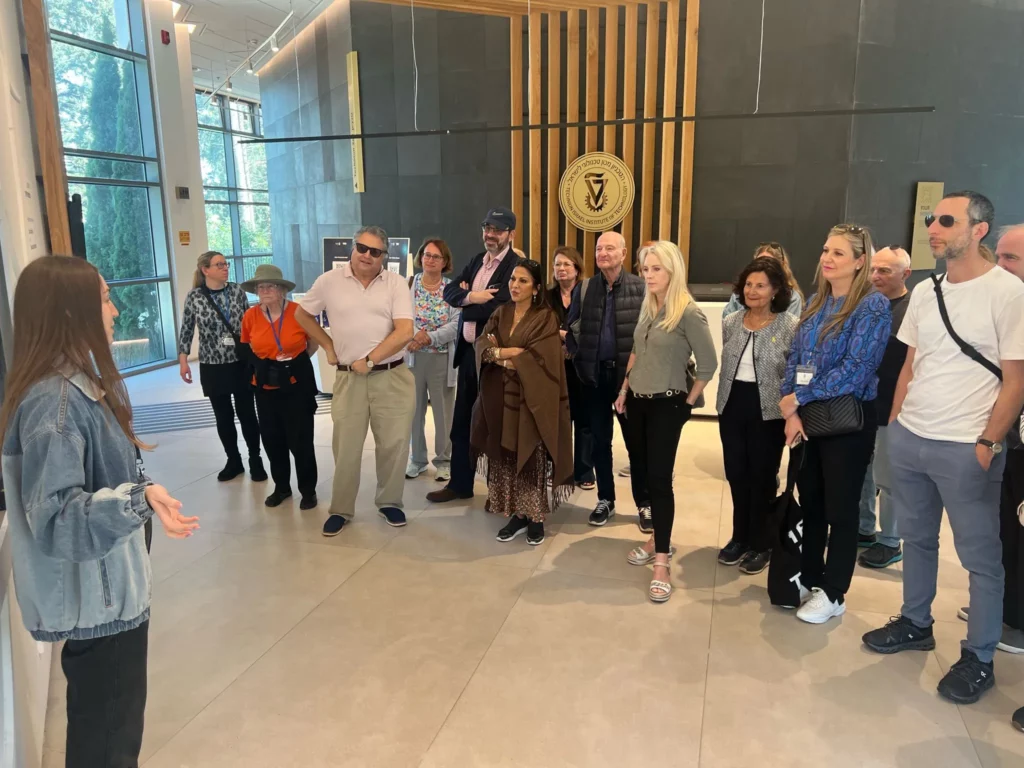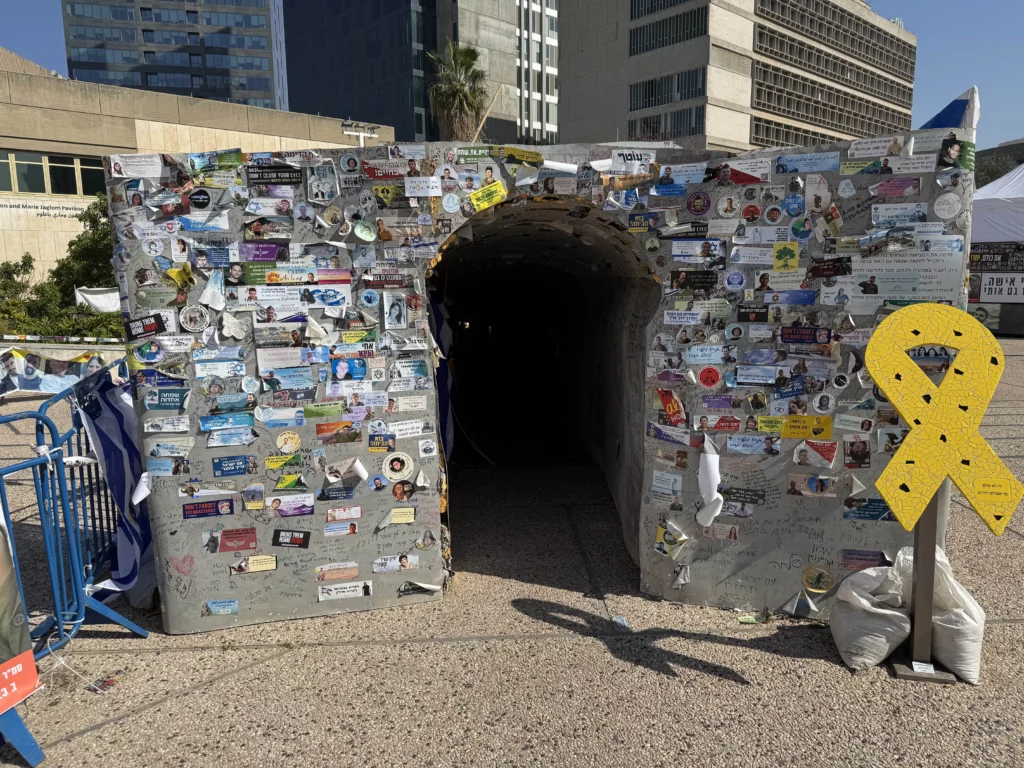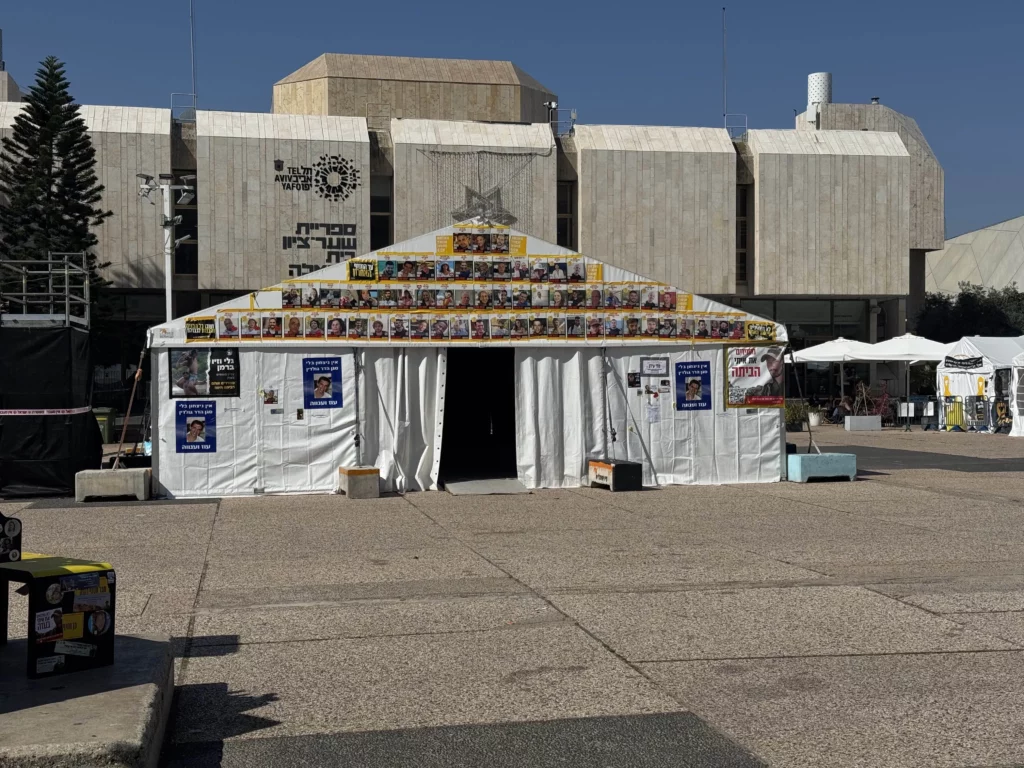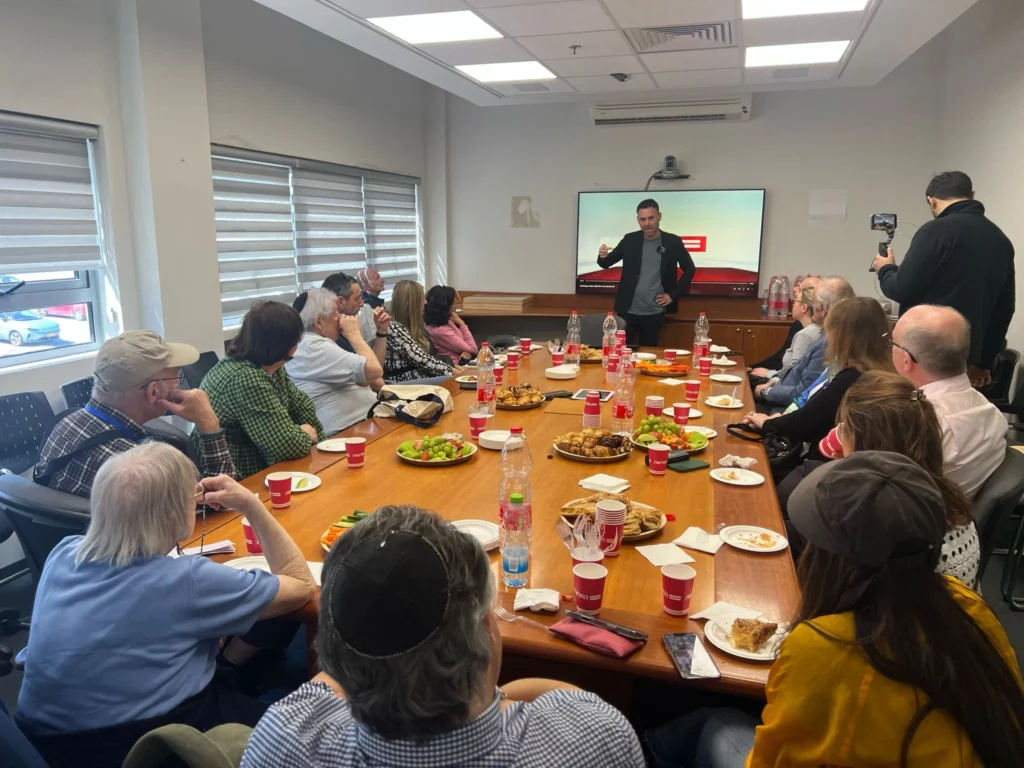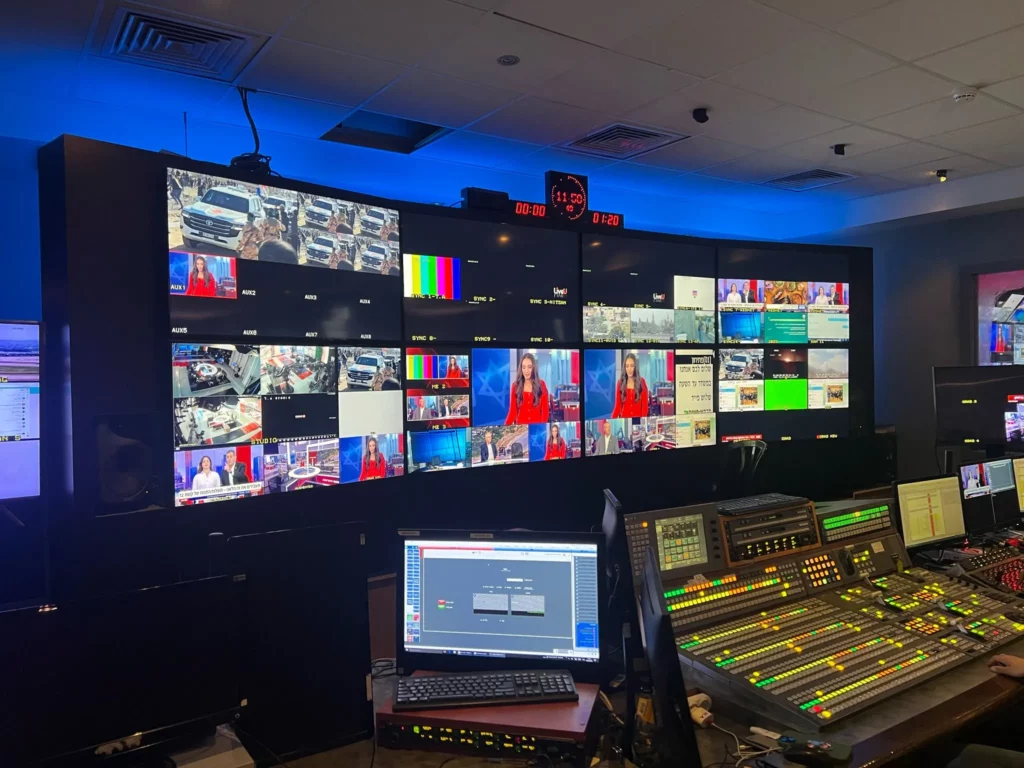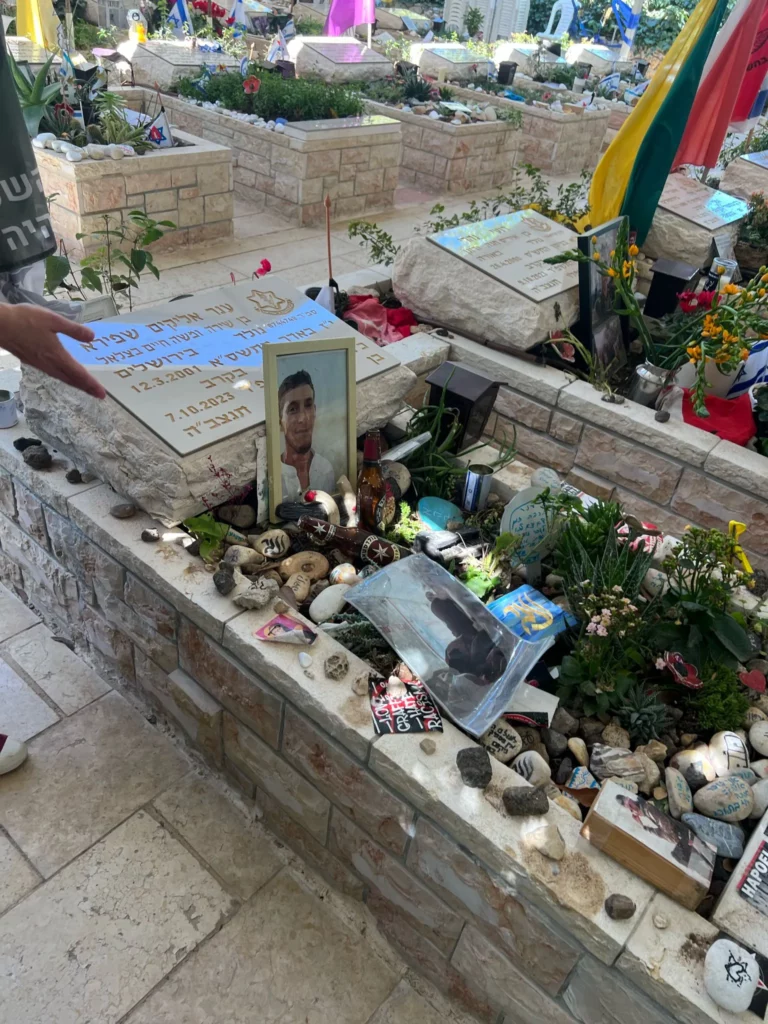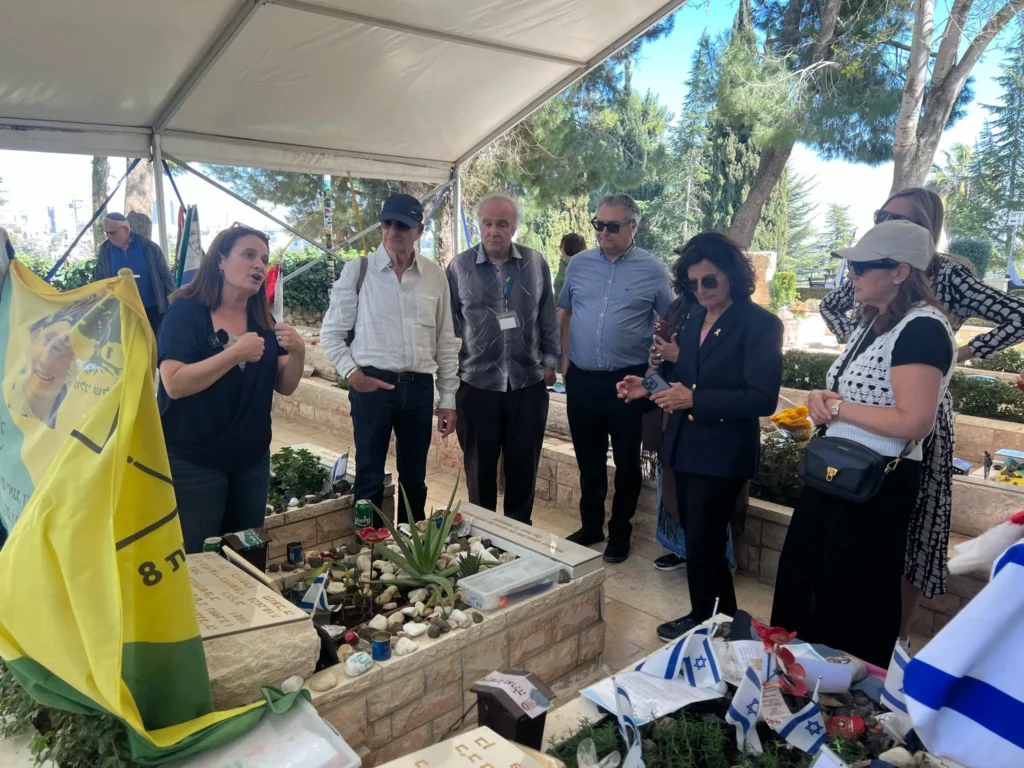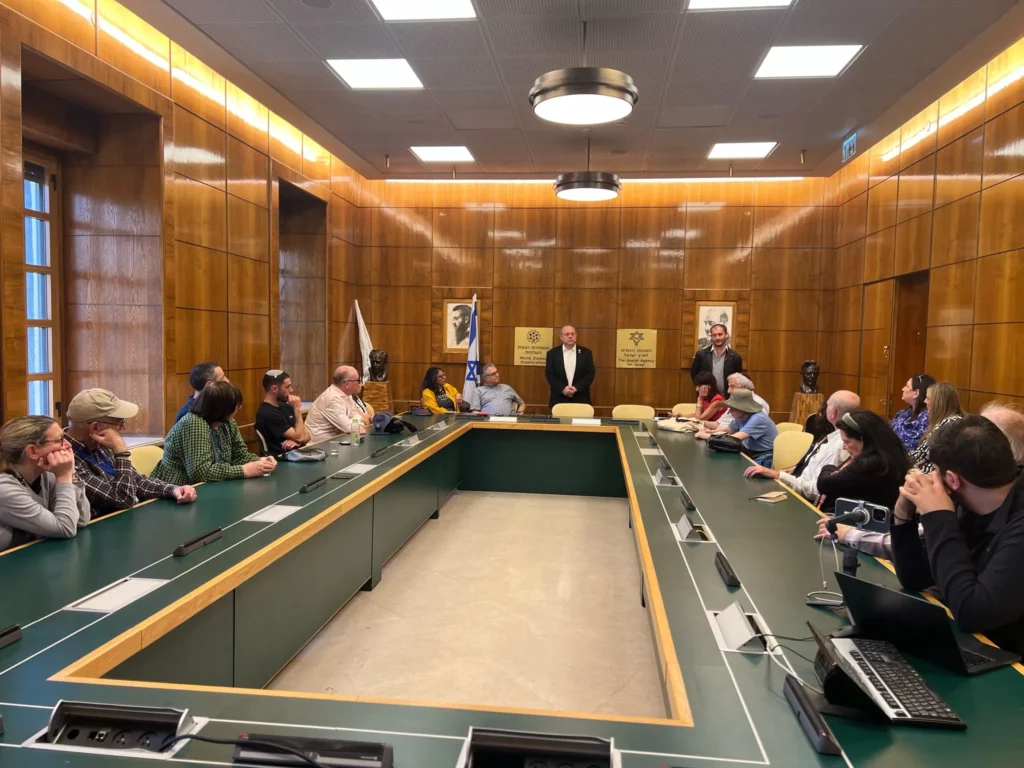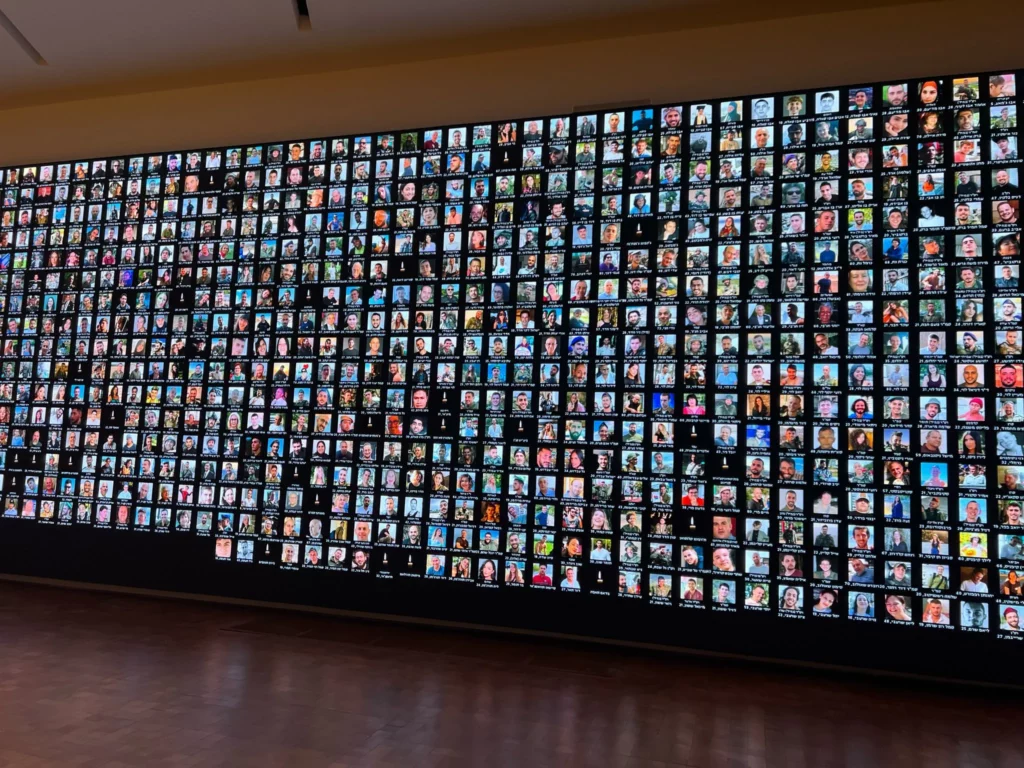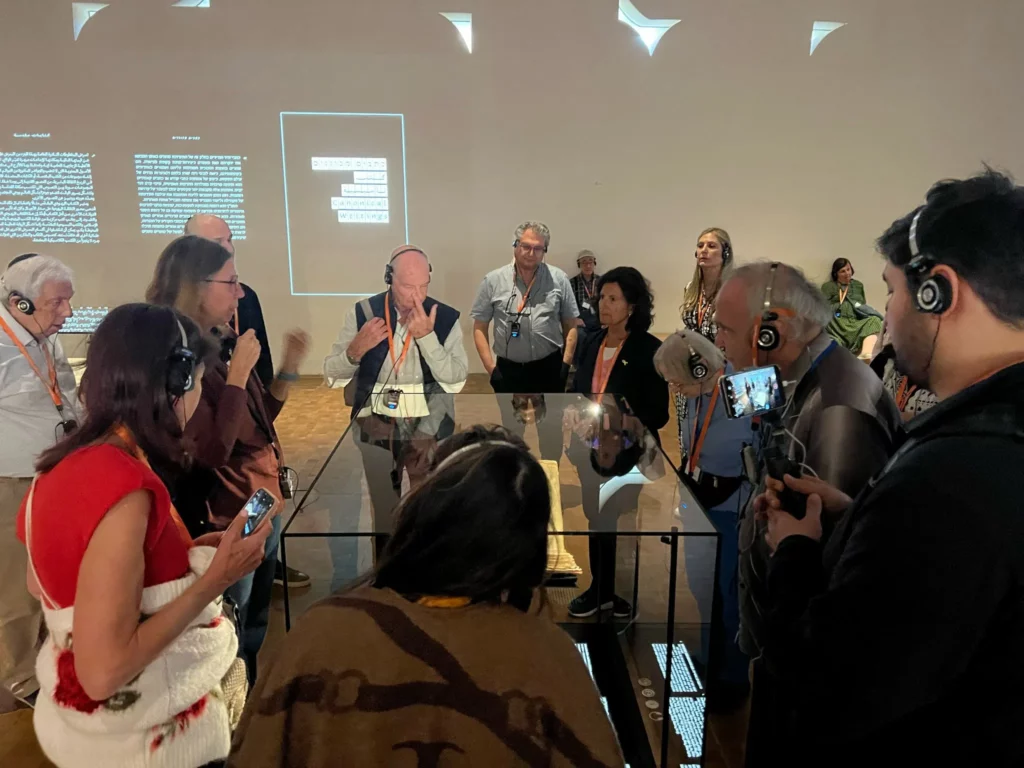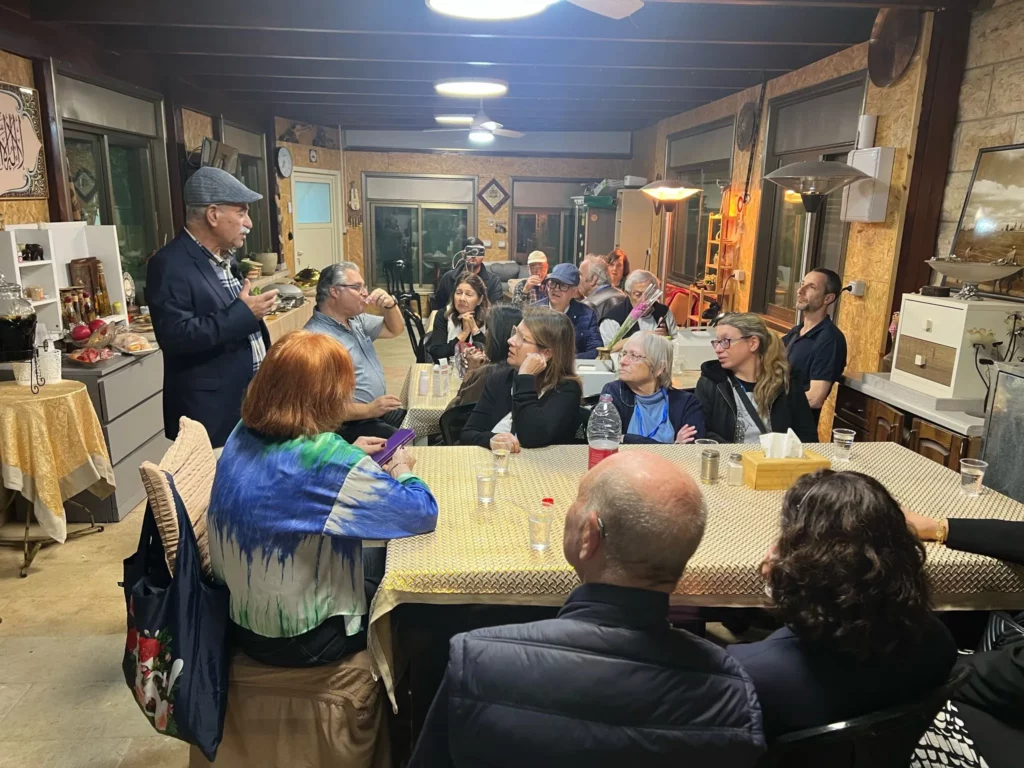Thanks for organising an amazing trip which will live long in the memory! It was a fantastic experience, well organised with a great variety of meetings, trips and experiences. Well done to you and Alan and thanks for hosting some of my friends and family! hope you had a restful few days after! Take care,
Ben
I appreciate the hard work you and Alan put in to organising the recent trip. The daily activities were well planned, very interesting and at times an eye opener on the ongoing innovations being undertaken especially at the Technion.
Michael
I would strongly recommend future trips to everyone. They will come back in awe at times at what a fantastic country Israel is and how lucky we are to be part of it.
“It was so wonderful to experience the crème de la crème of Israel. From visiting the Technion and hearing from inspirational professors like Prof. Marcelle Machluf, whose groundbreaking Nano ghosts are paving the way for Alzheimer’s cures, to engaging with incredible speakers like Mayan Jaffe and the ever-compelling Miri Eisen; the experience was truly remarkable and was a real insight into the start-up nation mentality.
Tali Kramer
Visiting both Hostage Square and Mount Herzl was deeply emotional and a stark reminder of the ongoing struggle, as we keep the hostages in our thoughts and prayers, hoping for their safe return. Also, being the first group post-October 7th to visit Abu Gosh was a profound experience, adding yet another layer of meaning to an already unforgettable trip
Visiting Channel 12 News, witnessing the innovations at IAI, and being immersed in an academic environment was eye-opening. It was equally uplifting to visit Uri Geller’s museum, meet the man himself, and explore the iconic new Jerusalem National Library. Also, learning from The Times of Israel founder, a former Brigadier General in the I.S.A, and IDF soldiers provided invaluable insights into the country’s leadership, security, and resilience.
This inspiring trip is a must for anyone, young or old, seeking to deepen their understanding of Israel, its extraordinary people, and its rich culture. I can’t recommend it enough!”
A rather belated thank you to both for an incredible trip and learning experience.
Karen and Mark
You packed so much in and all so informative and rewarding.
I am still thinking about so much of it
A few short words for your publicity-
A trip like this leaves its legacy and so much food for thought.
It marks both the ever present threat and current sense of despair against a backdrop of hope and optimism manifested
In the incredible development and achievements of the Technion.
Such a mix of emotions throughout each day – understanding the dilemmas that face the people of Israel and and then surrounded by
The country’s beauty and advancements the modern world. The trip curates a careful balance between the two with speakers, visits to key sites and
Dialogue to digest and understand.
Come away as a Jew feeling connected, worried but hopeful for a better future
Thank you both again
Let me know the dates of your next trip in case anyone should ask and we can pass on.
March 2025 Trip updates
Welcome to the Technion UK Israel Trip March 2025 updates
Day 1
The trip began with a warm welcome from Ida Symons and Alan Aziz, who set the tone for an engaging and tightly scheduled journey. The diverse group of participants introduced themselves, sharing their backgrounds and personal connections to Israel and the Technion. With a packed itinerary ahead, Ida stressed the importance of punctuality and flexibility, ensuring everyone maximises this unique and insightful experience.
Briefing from Maayan Jaffe-Hoffman
Maayan Jaffe-Hoffman provided a comprehensive and insightful briefing on Israel’s current geopolitical and security challenges, offering a detailed analysis of key developments.
She began by addressing the hostage crisis in Gaza, informing us that 59 hostages remain in captivity. Intelligence suggests at least 20 are alive, but negotiations have stalled due to Hamas’ demands. As a result, Israel is preparing for further military action.
On the military front, Maayan explained that despite extensive operations, Israel has not fully eradicated Hamas. The group remains a significant threat, particularly due to its intact underground tunnel networks. She noted that with the appointment of Eyal Zamir as the new Chief of Staff, we can expect a more aggressive military approach.
Maayan then turned to the Iranian nuclear threat, warning that Iran continues to advance its programme, causing deep concern among Israeli and Western leaders. She explained that while the Trump administration favours sanctions and diplomacy over military action, any strike on Iran’s facilities would require U.S. coordination.
Discussing regional threats, Maayan highlighted the ongoing instability in Syria and along the Hezbollah-controlled border. She noted that while buffer zones have been established, Iran’s supply routes to Hezbollah have been disrupted, yet the group remains a threat. Meanwhile, she pointed out that Houthi forces have resumed issuing threats, creating further regional tensions and affecting international shipping, with both the U.S. and UK impacted.
On the diplomatic front, Maayan shared striking insights into the decline in U.S. support for Israel. She cited a Gallup poll showing that only 46% of Americans now support Israel—the lowest level since 2001. Even more concerning, she noted that younger Americans express more support for Palestinians (48%) than for Israel (29%). She warned that this shift underscores the urgent need for Israel to reassess its international image and PR strategy.
Domestically, she revealed that Israeli politics remain in turmoil, with a staggering 73% of Israelis believing Netanyahu should resign over his handling of the October 7th attacks. Also 87% of Israelis believe that Netanyahu should apologise for what happened on October 7 She pointed out the growing uncertainty about Israel’s political future. Additionally, Maayan discussed Israel’s move to block UNRWA operations in Jerusalem, linking this to broader concerns over Palestinian statehood, which she described as unviable due to security risks and a leadership vacuum.
On the issue of Haredi military service, Maayan explained the deepening national debate over their exemption from the IDF. She highlighted concerns about the economic and social consequences if this situation remains unchanged.
Finally, Maayan examined Israel’s economic challenges, noting the strain caused by the ongoing war. Inflation and hiring freezes are affecting multiple sectors, but she reassured us that Israel’s high-tech industry, particularly in AI and cybersecurity, remains globally competitive despite these pressures.
Uri Gellar
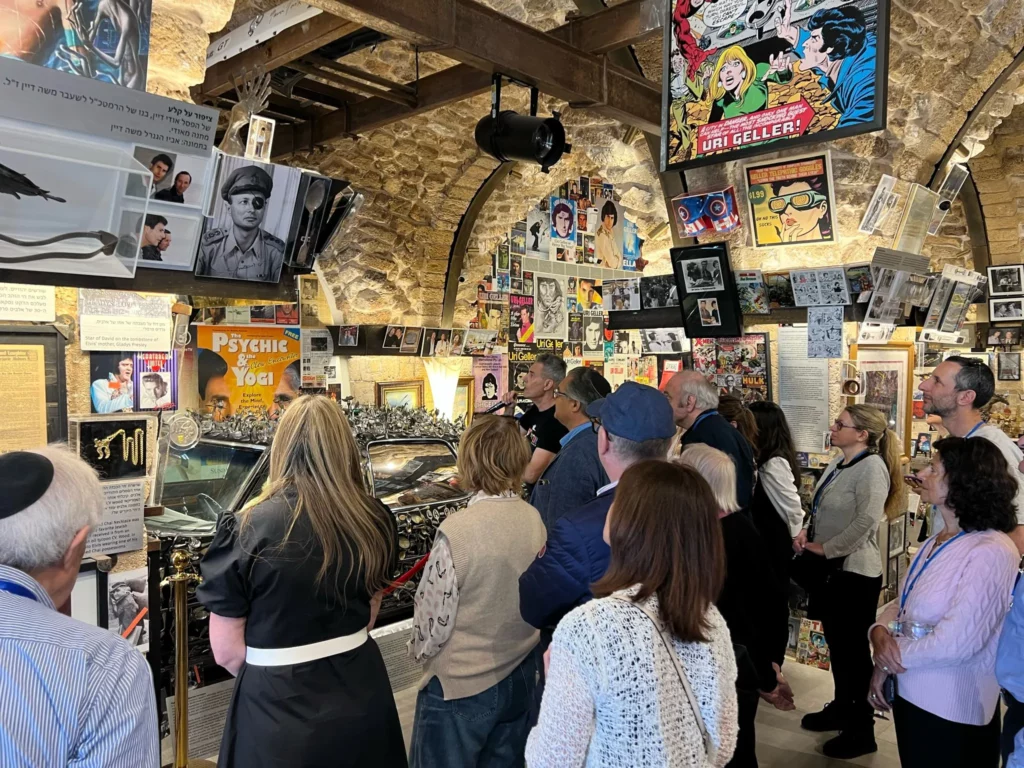
During our visit to Uri Geller’s museum, we were fortunate enough to have Uri himself guide us through the fascinating collection of artefacts. As we moved from one intriguing item to another, Uri shared captivating stories behind each piece. His enthusiasm was infectious as he detailed the historical and mystical significance of items such as a Cadillac covered in bent spoons and various objects gifted by celebrities and historical figures. He pointed out spoons contributed by famous figures like John Lennon, Salvador Dalí, and Michael Jackson, each with its own unique backstory. Each story seemed to weave a narrative that blurred the lines between reality and the supernatural, inviting us to question the limits of the human mind and the mysteries of the universe. His detailed explanations left us pondering the profound connections between art, history, and psychic phenomena.
Another exhibit related to Elvis Presley deals with the time of his death. On his deathbed some of his hair turned grey and his hair dresser who was Jewish decided to colour the white hair one by one with a mascara stick which was exhibited in the museum.
Tea at the British Ambassador’s residence and meet the ambassador to Israel
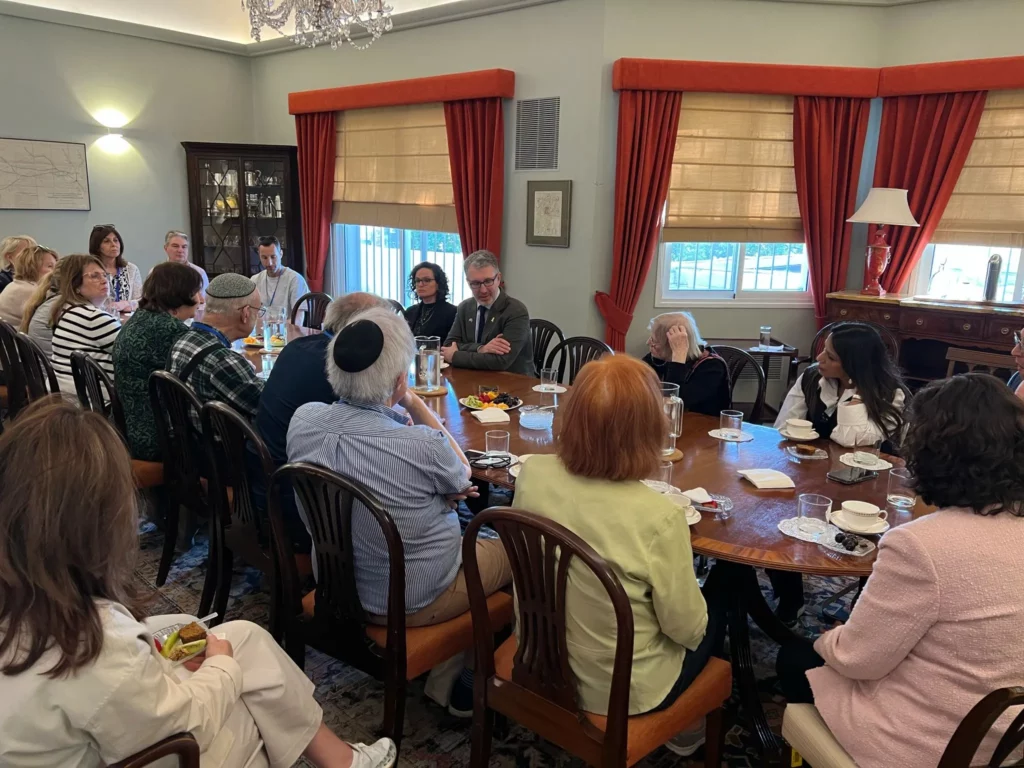
During an engaging visit to the British Ambassador’s residence in Israel, guests had the unique opportunity to meet His Majesty’s Ambassador to Israel, Simon Walters, and gain insights into the UK’s diplomatic efforts in the region.
Ambassador Walters, who was appointed to his role in July 2023, has had an extensive diplomatic career spanning key postings in the Middle East. Prior to his appointment, he served as Director of National Security for the Middle East and Africa at the Foreign, Commonwealth & Development Office (FCDO) from 2019 to 2022. His previous roles include Policy and Requirements Director at the Foreign and Commonwealth Office (FCO) and Regional Lead for South-Eastern Europe in Istanbul. His long-standing engagement with the region includes postings as Her Majesty’s Consul in Jerusalem (2008–2011) and diplomatic assignments in Egypt, Saudi Arabia, Iraq, and Yemen. With full-time language training in both Hebrew and Arabic, his deep understanding of the region’s complexities was evident throughout the discussion.
The Ambassador spoke about the multifaceted work of the British Embassy in Israel, emphasising the importance of fostering strong bilateral ties beyond government-to-government relations. He highlighted the vital role of academic collaborations, research, innovation, and trade partnerships in strengthening UK-Israel relations, with a particular focus on the Technion as a key academic partner.
The delegation also had the pleasure of meeting Iris Barner, Country Director for the British Council in Israel. Iris Barner, who joined the British Council in 2016, has played a key role in shaping and evaluating higher education and research initiatives. Her previous experience includes working as a Programmes Manager at both the British Embassy and the Delegation of the EU to Israel. Iris shared valuable insights into UK-Israel cooperation in higher education, science, arts, culture, and English language initiatives.
One of the flagship collaborations discussed was BIRAX (the Britain Israel Research and Academic Exchange Partnership). Iris Barner elaborated on this prestigious initiative, a multi-million-pound collaboration between the British Council, the British Embassy in Israel, and the Pears Foundation. BIRAX supports world-class research, fostering joint projects between British and Israeli scientists across various fields, from medical breakthroughs to environmental sustainability.
Acknowledging the ongoing conflict, Ambassador Walters expressed his determination to maintain focus on broader diplomatic and economic cooperation. He discussed the current geopolitical landscape, describing the precarious state of negotiations regarding a ceasefire and the return of hostages. He stressed that, drawing from his experience in conflict resolution, a lasting solution cannot be achieved through military force alone—diplomatic efforts must run in parallel.
The discussion also covered the UK’s role in regional stability, including support for Lebanon’s armed forces and efforts to curb threats from Hezbollah. The Ambassador reflected on the evolving political dynamics in Saudi Arabia under Crown Prince Mohammed bin Salman, noting the country’s significant internal reforms and its potential role in reshaping Middle Eastern relations. He conveyed cautious optimism about the possibility of broader regional realignment, including improved ties between Israel and Arab nations.
A key topic was the future of Gaza and the role of Hamas. The Ambassador reiterated the UK’s firm stance that Hamas has no place in any future governance structure. He emphasised the need for a long-term strategy that ensures Gaza’s security, reconstruction, and a governance model that excludes terrorist elements. While recognising the challenges ahead, he underscored that political solutions must be found to avoid prolonged violence and instability.
The conversation also touched on the rise of antisemitism in the UK, particularly in the wake of recent events. The Ambassador acknowledged the concerns of British Jews and reassured guests that the UK government remains committed to combating hate and ensuring the safety of all communities.
The meeting concluded with a candid discussion on the future of the region, the unpredictable trajectory of the conflict, and the critical decisions that lie ahead for leaders and citizens alike. While acknowledging the immense challenges, Ambassador Walters maintained a professionally optimistic outlook, reinforcing the UK’s commitment to diplomacy, dialogue, and meaningful engagement in pursuit of a more stable and prosperous future.
Briefing from Miri Eisen, Retired Colonel of the Israel Defence Forces
The final talk of the day was a powerful and in-depth briefing by Miri Eisen, a retired Colonel of the Israel Defence Forces, who provided a detailed analysis of Israel’s current geopolitical and security landscape. She outlined the impact of the October 7th attacks, the ongoing war, and the broader implications for the region and beyond.
Eisen began by addressing the hostage crisis, highlighting that 59 hostages remain in Gaza. She explained how Hamas strategically planned their mass attack, which included mass casualties, abductions, and the creation of chaos to hinder Israel’s response. The hostages, both dead and alive, remain a core issue for Israeli society, though she noted that international attention has waned. She described the dilemmas facing Israel in negotiating their release, particularly Hamas’ demand to free all Palestinian prisoners in exchange. This has caused deep divisions within Israel, as it presents an impossible choice between securing the hostages’ return and maintaining national security.
Expanding on the military situation, Eisen described Israel’s multi-front war. Beyond Gaza, Hezbollah continues to pose a serious threat from Lebanon, and Israel has targeted key Hezbollah leaders and weapon stockpiles. Hezbollah suffered major losses, forcing them to sue for a ceasefire in late 2024, but the threat remains. Meanwhile, the Houthi rebels in Yemen have resumed attacks, threatening further escalation.
A significant shift in the region was the collapse of Bashar al-Assad’s regime in Syria in December 2024, following relentless attacks on Hezbollah and Iranian forces by Israel. This has left a power vacuum now filled by Ahmad al-Shara, a former Al-Qaeda affiliate leader turned Islamist figure. Eisen emphasised that his leadership poses new uncertainties for the Middle East, especially as the West debates how to engage with the emerging Syrian government.
Domestically, Eisen touched on Israel’s internal divisions, the strain on its military, and the challenges of governance amid the war. She noted that the country remains deeply divided over how to proceed with negotiations, military strategy, and rebuilding efforts. The upcoming budget decision in March 2025 could determine the future of the Israeli government.
Eisen concluded by acknowledging the broader ideological battle Israel faces. She highlighted the global rise of pro-Hamas sentiment, particularly among young people in the Arab world, and the concerning portrayal of Hamas leaders as revolutionary figures. She warned of the long-term implications for Israel’s security and international standing.
Throughout her talk, Eisen provided a clear-eyed, unfiltered analysis of Israel’s position, leaving the audience with a deeper understanding of the immense challenges the country faces.
Day 1 Album
Day 2
Itay Sherman – Israel Aerospace Industries
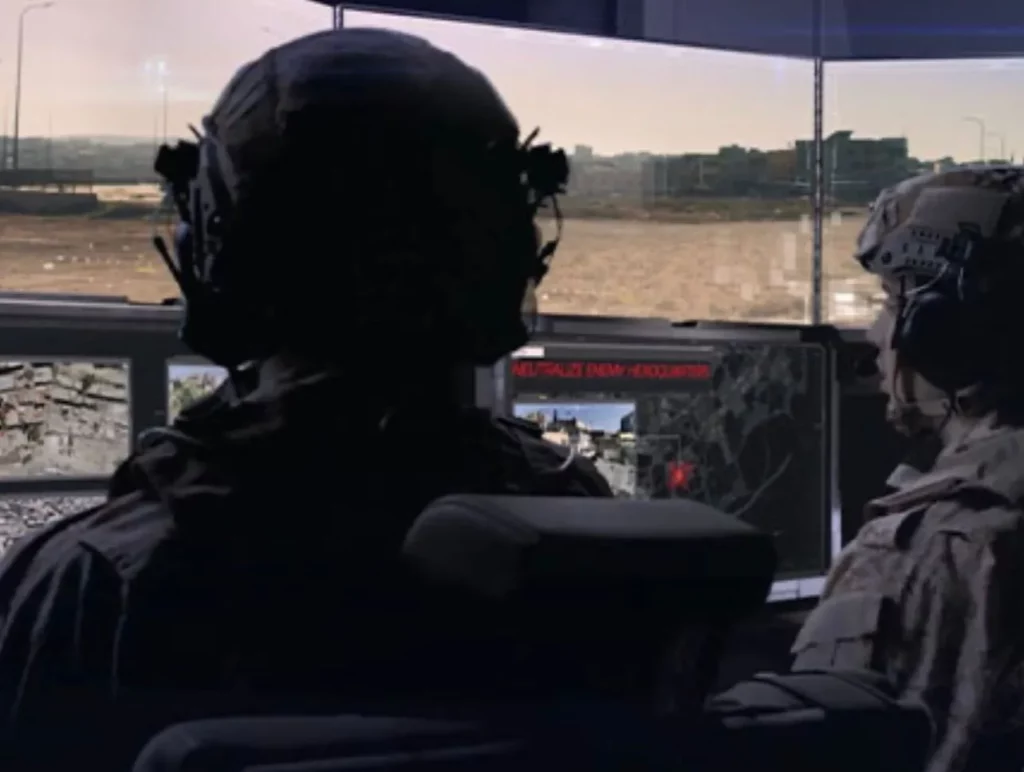
The day began with a visit to Israel Aerospace Industries (IAI), where the group was introduced to the company’s extensive defence and aerospace capabilities. Itay Sherman, Corporate Marketing Director, provided a comprehensive overview of IAI’s mission, operations, and strategic role in Israel’s national security. He highlighted that despite being a state-owned company, only 20% of IAI’s revenue comes from the Israeli Ministry of Defence, while 80% stems from international exports—strictly regulated and limited to friendly nations.
Sherman emphasised IAI’s pivotal role in Israel’s defence sector, dating back to its founding in 1953 by Shimon Peres and Al Schwimmer. Originally focused on aerospace, the company has since expanded into diverse domains, including land, sea, cyber, and space. He noted that IAI invests heavily in research and development, producing cutting-edge technologies that not only enhance military capabilities but also find commercial applications.
Key historical milestones were presented, such as IAI’s pioneering role in unmanned aerial vehicles (UAVs) since 1979, with the Heron TP—an unmanned aircraft the size of a Boeing 737—serving as a prime example of the company’s advancements. Additionally, he discussed IAI’s leadership in satellite technology, producing both commercial and defence satellites for Israel and its allies.
Sherman provided insights into IAI’s collaboration with the UK, mentioning key projects like the provision of automatic protection systems for Challenger 3 battle tanks and involvement in the development of defensive solutions for Boxer vehicles. He acknowledged the challenges posed by anti-Israel protests in the UK but affirmed that these have had minimal impact on IAI’s operations.
Regarding Israel’s layered air defence strategy, Sherman elaborated on the Iron Dome system, which intercepts short-range threats, alongside the David’s Sling and Arrow systems, which counter medium- and long-range ballistic missiles. He explained that similar multi-tiered defence models could be adapted for other countries, including the UK and Ukraine.
A discussion on emerging technologies covered IAI’s work on laser-based interception systems, aimed at improving the “economy of battle” by providing cost-effective missile defence solutions. He also addressed Israel’s balance between domestic arms production and reliance on international allies, underscoring the country’s need to maintain sovereign capabilities while optimising resources.
Sherman concluded by acknowledging the challenges of global conflict and defence needs, reaffirming IAI’s commitment to innovation and collaboration with friendly nations.
Dr Shaul Niv Eliahou – Israel Aerospace Industries
Dr Shaul Niv Eliahou, Director of Applied Research at IAI’s Corporate Research & Development and a faculty member at the Technion’s Department of Aerospace Engineering, provided an insightful presentation on technology, innovation, and research at IAI. He explained the process of research and development within the company, focusing on how future technologies are identified and integrated into new products.
He detailed IAI’s structured approach to R&D, which operates across different levels of technological readiness. At the highest level, mature technologies (TRL 7 and above) are close to final production, while mid-range projects (TRL 4-6) involve adjustments to existing technologies. The lowest level (TRL below 4) represents fundamental research, where Dr Eliahou himself is actively involved.
Dr Eliahou described the challenges of innovation, particularly the “valleys of death” in R&D—the critical phases where many projects fail due to lack of funding, market demand, or technological feasibility. IAI successfully navigates these hurdles through strategic investments and collaborations with leading academic institutions, including MIT and Technion.
He highlighted IAI’s partnerships with research centres worldwide and its involvement in diverse technological fields, such as AI, quantum technology, and medical applications. IAI runs multiple innovation centres, including one in Tel Aviv and the Astra Space Accelerator, which supports startups in the space sector. A new initiative was also launched in India at the end of 2024.
A key aspect of his presentation was IAI’s collaboration with Technion, particularly with Prof. E. Karpas, who specialises in mission planning. Their joint research explores AI-based distributed and decentralised multi-agent autonomy, inspired by the behaviour of ant colonies—where agents operate independently yet remain focused on a shared mission.
Dr Eliahou also discussed IAI’s role in quantum research, including quantum sensors and radar applications, which involve entangled particles for enhanced detection capabilities. He concluded by mentioning his active involvement in system engineering research and his upcoming presentation at the Israeli Conference of Aerospace, which will be held at the Technion.
Technion Visitor Centre
At the Technion campus in Haifa, the group was welcomed to the Visitor Centre by Rachel, a third-year Data Science Engineering student, who guided the tour. She introduced the campus as a “mini city” with over 15,000 students, modern facilities, and a strong emphasis on holistic education. Technion requires students to take courses in humanities and sports alongside their technical studies, fostering a well-rounded perspective.
The tour began with a presentation on Technion’s history, tracing its role in shaping Israel’s technological landscape. Founded in 1912, Technion has played a pivotal role in developing Israel’s infrastructure, defence, and medical fields. Notable milestones include pioneering research in water engineering, robotics, and space exploration, as well as Nobel Prize-winning discoveries.
A short film showcased groundbreaking innovations, such as the discovery of the ubiquitin protein degradation system by Professors Aaron Ciechanover and Avram Hershko, which earned them a Nobel Prize. The tour also highlighted Prof. Dan Shechtman’s discovery of quasi-crystals, a scientific breakthrough initially met with scepticism but later recognised with a Nobel Prize in Chemistry.
Rachel introduced key Technion-led innovations, including Voiceitt, an AI-powered speech assistance app that helps individuals with speech impairments communicate effectively. Another highlight was Aleph Farms, a company that develops lab-grown meat from a single cell, offering a sustainable alternative to traditional meat production. This initiative, led by Professor Shulamit Levenberg, has three research labs on campus.
A unique exhibit featured the Nano Bible, a project designed to introduce high school students to nanotechnology. The entire Bible has been engraved onto a 20-nanometre-thick surface, requiring a powerful microscope to read it. The project was led by Technion’s current president, Prof. Uri Sivan, and demonstrates the university’s leadership in nanoengineering.
The visit provided a fascinating glimpse into Technion’s legacy of innovation, scientific excellence, and commitment to shaping the future.
Professor Marcelle Machluf
Professor Marcelle Machluf, Director of the Laboratory for Cancer Drug Delivery & Cell-Based Technologies, provided a compelling presentation on her groundbreaking research in two key areas: cancer drug delivery and cultivated meat.
She began by introducing her lab’s primary focus—developing technologies that enhance drug efficiency and precision while minimising side effects. A major challenge in cancer treatment is ensuring that drugs reach only cancerous cells without harming healthy tissue. To address this, her team has developed Nanoghosts, an innovative drug delivery system inspired by the body’s natural mechanisms.
Nanoghosts are derived from mesenchymal stem cells, which naturally home in on cancerous tumours. Her team removes the cellular content of these cells, leaving only the membrane, which retains its ability to target tumours. These ghost-like structures are then loaded with therapeutic drugs and injected into the bloodstream. Unlike traditional treatments, Nanoghosts selectively deliver their payload to tumours, including metastatic and brain cancers, without affecting healthy organs. This breakthrough not only enhances drug efficacy but also reduces toxic side effects, a significant limitation of conventional chemotherapy.
Professor Machluf explained that one of the greatest challenges in treating cancer is its ability to evolve and adapt. Cancer is “smart” in that it continuously changes, mutating to resist treatments and evade immune responses. Even within the same patient, cancer cells can alter their surface markers, making previously effective drugs ineffective over time. This is why many biological treatments, which target specific cancer markers, often fail after a period. Her approach with Nanoghosts circumvents this issue by targeting a broad range of tumour markers, ensuring that the treatment remains effective even as the cancer mutates.
She highlighted Nanoghosts’ potential for treating brain tumours, which are notoriously difficult to target due to the blood-brain barrier. The technology has also shown promise for multiple sclerosis (MS), reducing symptoms in animal models without any additional drug payload. Early research suggests that Nanoghosts could be adapted for neurodegenerative diseases like Alzheimer’s, as well as inflammatory conditions such as arthritis and psoriasis.
Professor Machluf is deeply involved in Technion’s ecosystem, having served as the former dean of her faculty. She continues to lead research initiatives within the university, where her startups have received support and investment. The Technion has played a crucial role in the development of her technology, providing both infrastructure and financial backing to help bring these innovations closer to clinical application. However, she also acknowledged the challenges posed by the recent war in Israel, which has impacted investment in research and development.
She then shifted to her work in cultivated meat, explaining how her background in tissue engineering led to this innovation. She described her approach to growing lab-produced meat using stem cells harvested from cow umbilical cords. These cells are cultivated on a scaffold made from chickpea-derived protein, providing a sustainable and ethical alternative to traditional meat production. Unlike many lab-grown meat companies striving to create whole cuts of meat, her focus is on producing high-quality minced meat, which accounts for 50% of global meat consumption. Her startup, MeatAfora, is growing within the Technion ecosystem, leveraging the university’s advanced research facilities and collaborations to drive its progress.
Her presentation demonstrated how advanced bioengineering can simultaneously tackle global health challenges and drive innovation in sustainable food production, with the Technion playing a vital role in accelerating these breakthroughs. She emphasised that while cancer remains an incredibly complex and ever-changing adversary, innovative technologies like Nanoghosts provide hope for more precise, adaptable, and effective treatments in the future.
Professor Uri Lesmes
Professor Uri Lesmes, an Associate Professor in the Department of Biotechnology and Food Engineering at the Technion, shared insights into the unique nature of his department and his research. Born in Colombia and having moved to Israel at the age of six, Professor Lesmes completed all his academic degrees at the Technion before returning as a faculty member in 2010. Currently serving as Vice Dean, he leads research focused on food digestion, bioactive compounds, and their interactions with human health.
He explained the historical and conceptual foundations of the department, which was established in response to Israel’s need for food security. Originating as a spin-off from chemical engineering in 1967, it remains the only food engineering programme in Israel, with all Israeli food engineers trained at the Technion. The department is globally distinguished by its project-based learning approach, strong industry collaborations, and high levels of hands-on training. Notably, Technion students have excelled in competitions like EIT Food Solutions, where they developed innovative solutions such as a vegan Labané made from oat industry byproducts.
Professor Lesmes also highlighted the department’s contributions to Israel’s recent challenges. Following the events of 7th October, nearly half of the students were recruited for military service, while those remaining initiated food production efforts to support soldiers on the front lines. Faculty members also organised appreciation events for returning reservists, reinforcing the community’s role in national resilience.
In the realm of FoodTech, the department plays a pivotal role in the EIT Food Accelerator Network, nurturing startups to reduce failure rates. He shared a success story of an Israeli startup that developed a method to reduce sugar in orange juice without additives, converting sugar into dietary fibre while maintaining the juice’s natural taste. This patented technology has already reached supermarket shelves.
Professor Lesmes then shifted to his own research, exploring how food processing has shaped human evolution. He argued that cooking was a fundamental factor in human brain development, making it a defining feature of our species. Tracing the history of food revolutions—from the mastery of fire to agriculture, canning, and now the rise of lab-grown foods—he emphasised that we are in the midst of a fourth food revolution. He discussed companies producing dairy and meat without animals, such as Remilk, which engineers yeast to produce milk proteins identical to those from cows.
A key aspect of his research involves studying the differences in food digestion between males and females. Using bioreactor models that simulate human digestion, his team discovered that milk proteins break down differently based on biological sex, influencing factors such as satiety. His findings suggest that dietary guidelines may need to be reconsidered to account for sex-based differences in nutrient absorption and metabolism.
Professor Lesmes also addressed alternative proteins, sustainability, and the challenges of modern nutrition. He spoke about mealworm-based burgers sold in Europe and the potential of insect-based proteins to offer sustainable, efficient food sources. Additionally, he introduced the Healthy Aging Initiative, aimed at redesigning foods to meet the needs of an aging population. His team developed a high-protein, fibre-rich breakfast cereal tailored for seniors, incorporating bioactive compounds to promote health. The product was well-received in taste tests and is pending commercialisation.
Concluding his talk, he reflected on the future of food, including the ethical and nutritional implications of innovations such as lab-grown mammoth meat. He stressed that while food technology advances rapidly, critical questions must be asked about health, sustainability, and the broader impact of these developments. Ultimately, he advocated for a balanced, evidence-based approach to nutrition, acknowledging the complexity of dietary choices in the modern world.
Professor Avi Shpigelman
Associate Professor Avi Shpigelman provided an insightful overview of his research and his role as the academic head of the Carasso Food Tech Innovation Center. His primary research focuses on food processing and its effects on food components, such as texture, physical interactions, and nutritional properties. Using milk as an example, he illustrated how even the simplest food undergoes significant transformations during processing, which is essential for commercialisation and extended shelf life.
However, his discussion centred on the newly established Carasso Food Tech Innovation Center, located at the Technion’s Haifa campus. This state-of-the-art facility is designed to provide hands-on experience for food engineering students. Initially established in 1977 as a faculty pilot plant, the facility had become outdated and unsafe. A decade-long effort, driven by an international committee’s recommendations, led to securing the necessary funding, culminating in the opening of the centre just a month ago.
The centre aims to be a leading hub for food tech and biotech, supporting research, industry collaboration, and community education. It works closely with the Hecht Alternative Protein Center, which focuses on developing sustainable and healthier food alternatives. This collaboration involves experts from various fields, including biology, medicine, and engineering, to advance alternative protein research. Additionally, the centre has recently signed an MOU with NAPIC in the UK, further strengthening international research ties.
The facility comprises four key pillars: a pilot plant with advanced R&D equipment, an industrial test kitchen and sensory lab for product testing, a fermentation and biomaterial analysis system crucial for biotechnology applications like precision fermentation, and an advanced analytics unit for in-depth food research. Notably, some of the equipment housed within the centre, such as high-pressure processing and pulsed electric field systems, are unique in Israel, offering novel food processing techniques that enhance food safety and quality while preserving sensory attributes.
Avi underscored the necessity of food processing in modern society, highlighting its role in ensuring food availability beyond farming communities. He concluded by emphasising the importance of investing wisely in advanced research equipment, ensuring their effective utilisation to drive meaningful innovation in food technology. Following the discussion, attendees were invited to tour the facility and explore its cutting-edge capabilities firsthand.
Benjamin, IDF Spokesperson
Benjamin, an IDF Spokesperson, addressed the group, offering insights into both the military’s strategic stance and the complex information war Israel faces in the global media. He began with a personal introduction, sharing his journey from London to Israel, where he has served in the IDF Spokesperson’s Unit for the past six years. Currently, he heads the strategy and messaging team within the international media branch.
Benjamin underscored the IDF’s unwavering commitment to bringing home the remaining 59 hostages from Gaza, 34 of whom are confirmed to have died in captivity. Since October 7th, this has remained a primary war objective. The recent releases of some hostages, juxtaposed with the tragic return of others in coffins, have only strengthened the IDF’s resolve to see this mission through.
He also addressed the IDF’s internal investigations into the failures of October 7th, which led to significant leadership changes, including the appointment of a new Chief of General Staff, Lieutenant General Eyal Zamir. These inquiries sought to understand both the intelligence miscalculations that underestimated Hamas and the operational failures during the attack. The lessons drawn from these inquiries, Benjamin emphasised, will shape the IDF’s future approach, ensuring that such an attack is never repeated.
Strategically, Israel is facing a “seven-front war,” engaging threats from Gaza, Lebanon, Syria, Judea and Samaria, Yemen (Houthis), and, most significantly, Iran. The IDF is taking proactive measures, conducting strikes in Syria to prevent weapons from falling into hostile hands and intensifying operations in northern Samaria to disrupt terrorist networks. In Lebanon, while committed to maintaining ceasefire agreements, Israel remains vigilant against Hezbollah’s movements.
Benjamin also elaborated on the challenges of the information war. He highlighted the asymmetry in global media coverage, where Israel’s adherence to factual reporting often puts it at a disadvantage against adversaries who weaponise misinformation. The IDF must carefully verify information before releasing it, which can mean losing crucial time in shaping the global narrative. He cited the October 18th Al-Ahli hospital incident as a prime example, where major news outlets quickly amplified Hamas’s false claims before Israel had a chance to provide evidence refuting them.
On improving Israel’s public image, he noted the IDF’s expanded multilingual media outreach and efforts to provide visual evidence from the field, such as images of Hamas tunnels beneath civilian homes. While Israel has adopted modern social media strategies, including presence on TikTok, conveying military actions effectively in a digital space dominated by younger audiences remains a challenge.
Despite these difficulties, Benjamin expressed immense pride in the IDF’s resilience and the dedication of its soldiers and reservists. He acknowledged the immense personal and economic sacrifices made by those serving, but also spoke of the deep sense of purpose driving them. For Israel, he concluded, this is not just a military operation—it is a fight for security, stability, and the future of the Jewish people.
Lior Akerman
Lior Akerman delivered an in-depth analysis of the complex political and security landscape in Israel, focusing on the ongoing challenges between Israel and the Palestinian territories. He emphasised the harsh realities faced by Palestinians in Gaza and the West Bank, noting that the younger generations have grown up knowing only conflict and military presence. He underscored the lack of viable Palestinian leadership capable of establishing an independent state, given the absence of strong governance structures.
A major point of concern raised was Israel’s internal political instability. With Israel having gone through 37 governments in 76 years, Akerman highlighted how frequent political changes prevent the formation of long-term strategies, particularly in key areas such as security, transportation, and economic development. He noted that Israeli leaders spend the majority of their time maintaining political coalitions rather than addressing pressing national issues.
Akerman also pointed to the absence of a coherent Israeli strategy regarding Hamas and the Palestinian Authority. He criticised Israel’s failure to communicate its actions and policies effectively to the international community, leaving the world to perceive Hamas as a legitimate national movement rather than a terrorist organisation. According to him, the lack of a unified, long-term security plan has resulted in recurring cycles of violence, with no clear vision for a resolution.
He reflected on past intelligence and military failures, particularly in underestimating Hamas’s capabilities. He acknowledged that warning signs were overlooked due to complacency, and commanders made critical misjudgments regarding the threat level. Akerman stressed that Israel must undergo a significant transformation in governance, ensuring that elected leaders have the stability and timeframe to execute long-term strategic plans. Without these structural changes, he warned, Israel would continue to face the same security and political crises in the coming decades.
Ultimately, he called for a more structured and strategic approach to both internal governance and external security policies. He proposed reforms to Israel’s political system, including direct elections for the prime minister, to create more stability. He concluded on a sombre note, expressing concern that without these changes, Israel would remain trapped in a cycle of short-term political survival rather than genuine progress.
Noa Bodner
The evening concluded with a wonderful dinner at a private villa, where guests enjoyed a delightful culinary experience in an intimate and welcoming atmosphere. Adding to the magic of the night, Noa Bodner took the stage for a special musical performance. In addition to her connection to the acclaimed Fiddler on the Roof production at Regent’s Park Open Air Theatre in London, she treated the audience to a nostalgic selection of classic Israeli songs from past Eurovision contests. Her heartfelt renditions brought a sense of joy and unity to the gathering, making for a truly memorable and uplifting end to the evening.
Day 2 Album
Day 3
Visit to Hostage Square
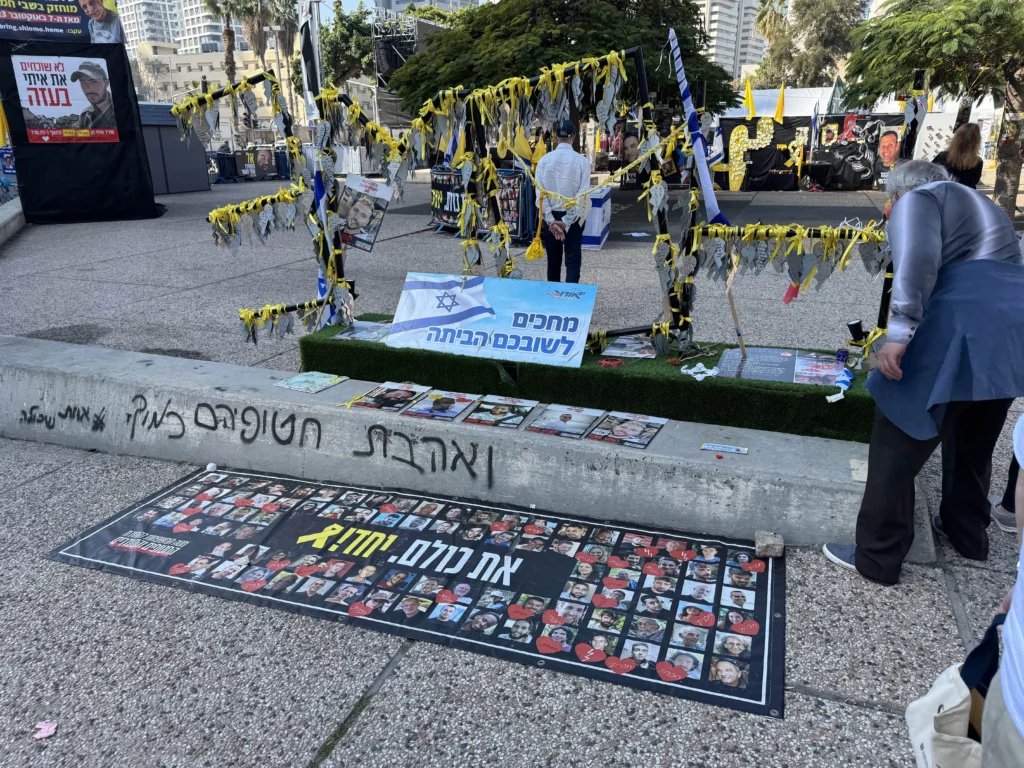
Day 3 of the trip started off by the group visiting the hostage square in Tel Aviv. As of today, it has been 522 days since the October 7th attack. The group was told about the many events that have been happening often each night and we saw a reconstruction of a fake, tunnel that has been made in the square to give people an idea of what the tunnels actually look like. All around the square there are personal messages left by thousands of people that have visited to show their support. We were told that the families of hostages often gather in the square to meet each other and to speak to well wishes and people who are praying for the safe return of the remaining hostages.
Channel 12 studio and briefing from Gidi Weinisch
Next, the group visited Channel 12’s studio, where they were given a tour by Gidi Weinisch, the Editor-in-Chief of the Daily Evening News and Chief Financial Editor. He provided an in-depth briefing on the events of October the 7th and the critical role Channel 12 played in covering and managing the crisis. The visit included a behind-the-scenes look at how the station operated under extreme conditions, offering 24/7 coverage while facing ethical dilemmas and logistical challenges.
Gidi recounted his personal experience on the morning of October the 7th, initially mistaking the sirens for an alarm clock before realising the gravity of the situation. At the newsroom, senior editors quickly recognised the unprecedented scale of the attack, acknowledging that existing protocols were insufficient to cover such an event. The newsroom became a vital source of information not only for reporting but also for aiding civilians and soldiers, as many in the southern kibbutzim used the media to communicate their whereabouts and seek rescue.
One of the biggest challenges faced by Channel 12 was deciding what footage to air and when to show it. They were inundated with horrifying images and live pleas for help from civilians under siege, forcing them to balance journalistic responsibility with ethical considerations. They had to make rapid decisions on whether to broadcast individuals directing soldiers to their homes while fearing that terrorists could exploit live coverage.
Beyond news coverage, the station took on an active role in crisis management, providing vital public service information about hospitals, temporary housing, and schools for displaced families. They also facilitated connections between donors and the military to help supply equipment for reservists. The war’s prolonged nature has left many Israelis feeling exhausted, with a noticeable decline in public protests compared to past national crises.
The discussion also touched on Israel’s struggle with global media narratives. Gidi and his team worked to counter misinformation, particularly surrounding accusations against Israel, such as the misreported hospital bombing. Channel 12 took the unusual step of broadcasting in English and pushing content onto social media to counter false claims. However, there was a strong sentiment that Israel’s government had failed to adequately manage international messaging.
The visit concluded with a tour of the studio and control room, where the group observed the preparations for a live broadcast. Gidi explained the newsroom’s daily operations, the decision-making process behind selecting stories, and the technological infrastructure that enables round-the-clock news coverage. The group was able to witness firsthand the intensity and precision required to manage a live newsroom in times of crisis.
Private tour at the Mount Herzl
After the visit to Channel 12, the group toured Mount Herzl, Israel’s national cemetery, guided by Shlomit. She provided historical context, explaining how the mountain has changed since October the 7th. Established in 1949, Mount Herzl is the final resting place of Theodor Herzl, the visionary of the Jewish state, as well as numerous Israeli leaders and fallen soldiers.
Shlomit recounted how David Ben-Gurion made the decision to bury Herzl in Jerusalem rather than Haifa, despite debate over the location. This was a strategic move to establish a strong Jewish presence in West Jerusalem after the 1948 War, especially as key Jewish sites, including the Old City and the Western Wall, were then outside Israeli control. The group observed Herzl’s simple yet symbolic grave, surrounded by cedar trees representing the materials used in the construction of the ancient Temple in Jerusalem.
The group heard how many thousands of people attended so many of the funerals of the fallen soldiers and when the public finds out that there is a funeral for a soldier from overseas who may not have much family here so many people many thousands made such an effort to come and attend his or her funeral.
The tour continued to the military cemetery, which has grown significantly since October the 7th. Shlomit explained that in the aftermath of the attack, Mount Herzl became the final resting place for a large number of fallen soldiers, requiring multiple funerals each day. Many of those buried were reservists who immediately responded to the crisis. The group visited several graves, including that of Nathaniel Young, a British-born soldier who made Aliyah in 2021, and a beloved history teacher who was called up for reserves and tragically lost his life.
A particularly moving moment came when the group visited the grave of Aner Shapira, who heroically saved lives at the Nova Festival by throwing back grenades before being killed. His story, along with those of many others buried there, underscored the immense personal sacrifices made in the defence of Israel.
The tour concluded with a visit to a memorial for Ethiopian Jews who perished while making the treacherous journey to Israel. Shlomit emphasised the importance of remembrance and resilience, highlighting the role of education in honouring those lost while ensuring the future of the Jewish state.
The visit to Mount Herzl was a deeply emotional and thought-provoking experience, reinforcing the significance of the sacrifices made for Israel’s survival and the enduring spirit of its people.
Briefing from David Horovitz
Following the visit to Mount Herzl, the group attended a briefing with David Horovitz, the Founder and Editor of The Times of Israel. With his deep understanding of Israeli politics and media, Horovitz provided a candid and thought-provoking analysis of the current situation in Israel, particularly in the aftermath of October the 7th.
Horovitz highlighted the scale of The Times of Israel’s readership, noting that in 2024, the publication reached 92 million unique users and recorded nearly a billion page views. During the war, it ranked among the top 50 English-language news sites worldwide. He underscored the importance of accurate reporting and how the media plays a crucial role in shaping global perceptions of Israel.
He addressed the failures that led to October the 7th, stressing that despite vast intelligence knowledge, Israeli leadership underestimated the threat from Hamas. He noted that even the Chief of Staff of the IDF had previously believed the Gaza border was the least concerning of Israel’s security challenges. This miscalculation had devastating consequences. He also touched on the emotional toll, explaining that Israel has yet to fully process the horrors of that day, as the country has been focused on the hostages and ongoing military operations.
Horovitz expressed deep frustration with Prime Minister Netanyahu’s leadership, particularly his refusal to take responsibility for the failures leading to the attack. He pointed out that a significant majority of Israelis, according to a recent poll, believe Netanyahu should resign. He also criticised the lack of a state commission of inquiry, which he argued is essential to ensuring such an attack never happens again.
The discussion then turned to the hostages still held in Gaza. Horovitz detailed the complexity of negotiations and the political obstacles preventing a swift resolution. He strongly advocated for a deal to secure the release of the remaining hostages, noting that Hamas continues to exploit every stage of the negotiation process. He expressed concern that the current political stalemate is preventing Israel from making decisive moves, leaving the country in an unstable and uncertain position.
Throughout the session, Horovitz emphasised the importance of international support for Israel. He acknowledged the rise of anti-Israel sentiment in the West, particularly in the UK and the US, but reiterated the need for people to visit Israel, witness the reality firsthand, and counter misinformation with knowledge and experience.
The briefing concluded with an engaging Q&A session, where Horovitz responded to the group’s insightful questions, offering further clarity on Israel’s military, political, and diplomatic challenges. His analysis left the group with a deeper understanding of the complexities Israel faces and the crucial role media plays in shaping global narratives.
Tour of the Jerusalem National Library
After the briefing with David Horovitz, the group had a private tour of the newly built Jerusalem National Library, an architectural and cultural landmark designed to preserve and showcase the literary and intellectual treasures of the Jewish people and Israel.
The tour began with a short introductory film that explored the significance of texts in Israeli society, featuring individuals from diverse backgrounds sharing meaningful literary influences. The group was then guided through the library’s permanent and temporary exhibitions, gaining insight into the evolution of the institution, which dates back to the late 19th century when Yosef Hazanovich, a passionate book collector, began amassing Jewish literary works.
The library’s core mission was explained: not only to collect and preserve but also to make knowledge accessible to the public. This shift was the driving force behind the creation of the new building, designed by Swiss architects Herzog & de Meuron, known for their work on London’s Tate Modern. Every aspect of the design, from the natural lighting to the open reading spaces, was conceived to encourage public engagement while ensuring the longevity of its rare collections.
One of the highlights of the visit was the permanent exhibition featuring rare and historical manuscripts, including the Damascus Keter, a thousand-year-old Torah manuscript, and original writings by Maimonides. The group also viewed a first-edition Talmud printed by Christian publisher Daniel Bomberg in the 16th century, which established the format still used today.
The tour also included a visit to the temporary exhibition on Franz Kafka, marking the 100th anniversary of his death. It showcased Kafka’s personal letters, his connection to Zionism, and his dream of moving to Tel Aviv.
A key stop was the library’s state-of-the-art book storage system, where millions of volumes are preserved under special conditions. The group observed the high-tech robotic retrieval system that operates in a low-oxygen environment to prevent fire and decay. Books are stored in bins assigned by barcode rather than traditional categories, ensuring an efficient yet secure retrieval process.
The visit to the Jerusalem National Library provided a fascinating look into the preservation of Jewish heritage and the role of literature in shaping Israeli identity, leaving the group with a deep appreciation for the institution’s historical and cultural significance.
Issa Jaber, the former mayor of Abu Gosh
The final visit of the day took the group to Abu Ghosh, an Arab-Israeli town located 10 kilometres west of Jerusalem, where they were hosted by Issa Jaber, the former mayor. Abu Ghosh is known for its strong ties with Israel, a relationship that dates back to 1948 when, unlike many other Arab towns, its residents chose to remain in Israel rather than flee at the urging of the Mufti of Jerusalem. Since then, the town has lived in complete harmony with its Jewish neighbours, fostering a unique model of coexistence.
Issa warmly welcomed the group, expressing a special appreciation for their visit as they were the first international group he had hosted since October the 7th. Before beginning his talk, he invited the group to enjoy a meal of homemade local dishes prepared specially for them, featuring traditional delicacies such as kubbe, mujaddara, and stuffed grape leaves.
During his talk, Issa shared his personal experience of October the 7th, recalling how he was preparing to host a group from Boston when he received news of the attack. Like many in Israel, he was shocked by the brutality of the events. He strongly condemned the actions of Hamas, stressing that such atrocities do not reflect Islam’s principles of peace and tolerance but rather the extremist ideologies of political factions seeking to exploit religion.
He then spoke about Abu Ghosh’s history and its deep-rooted commitment to peaceful coexistence. The town has long played a role in supporting Jewish communities, including during the 1936–1939 Arab revolt when Abu Ghosh residents protected nearby Jewish settlements. In return, during Israel’s War of Independence in 1948, Jewish communities ensured the town’s safety, making Abu Ghosh one of the few Arab towns to remain intact. Today, this legacy continues, with Jewish and Arab families living side by side in peace.
Issa also discussed broader challenges faced by Arab citizens of Israel, particularly in times of conflict, when tensions between Jewish and Arab communities can rise. However, he remains optimistic, believing that peace is a strategic necessity and that dialogue is key to rebuilding trust. He emphasised that the vast majority of Israeli Arabs seek stability and integration rather than division.
The visit concluded with a Q&A session, where Issa answered questions about political representation, relations with other Arab communities, and the impact of the war on daily life. He reiterated his belief that peace is possible through education and mutual respect. The visit to Abu Ghosh was a powerful and inspiring end to the day, offering a glimpse into a community that has successfully embraced coexistence despite the challenges of the region.
Day 3 Album
Day 4
Elizur B. – The Role of Meteorology in Air Force Operations
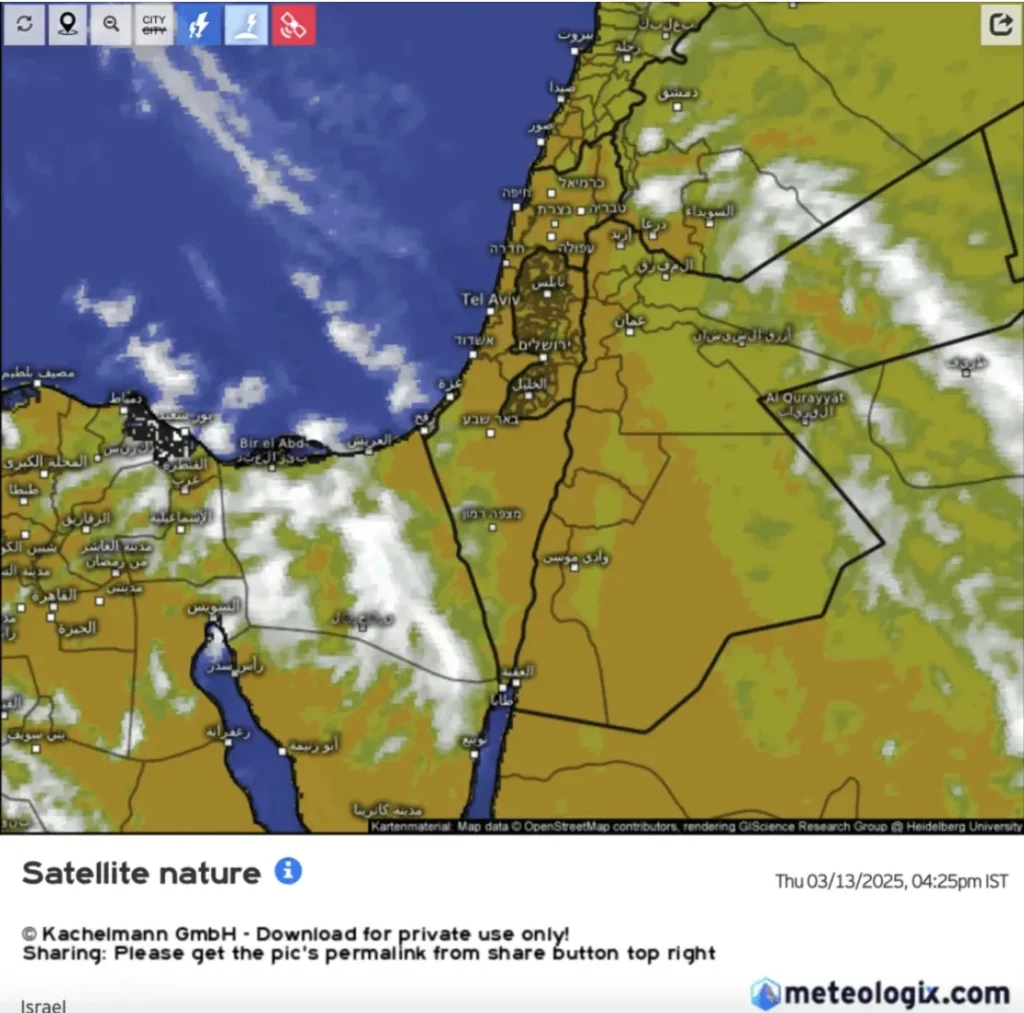
The day started with a compelling briefing from Captain Elizur B., soon to be a major Elizur B. is a commander of the Operational Forecasting Wing in the Israeli Air Force’s Meteorology Unit. He delivered a fascinating insight into the critical role of meteorology in military operations. While many may not immediately recognise the importance of weather in warfare, history has shown time and again how meteorological conditions can significantly impact the success or failure of military campaigns.
Elizur provided historical examples, starting with Napoleon’s disastrous invasion of Russia in 1812, where an unanticipated harsh winter decimated his troops. He also discussed the critical role of weather forecasting in the success of D-Day during World War II, where British meteorologist James Stagg convinced Allied leaders to delay the invasion by one day to take advantage of a brief window of improved weather—something the German forces did not anticipate. He further examined the failure of the U.S. Operation Eagle Claw in 1980, an attempted hostage rescue in Iran that was thwarted by an unpredicted sandstorm. This failure led to a lasting shift in military doctrine, ensuring that meteorologists are now an integral part of classified mission planning.
Delving into the science of meteorology, Elizur explained the complexities of atmospheric physics, covering thermodynamics, fluid dynamics, and the influence of oceanography and chemistry on weather systems. He noted that while modern numerical weather models powered by supercomputers have revolutionised forecasting, they still have limitations. Meteorologists are essential in interpreting these models, correcting errors, and providing real-time assessments crucial for military decision-making. He illustrated this by showing discrepancies between model predictions and actual satellite images, underscoring the need for expert human analysis in operational forecasting.
He then shifted focus to the unique meteorological challenges in Israel and the region. Despite perceptions of Israel as a predominantly dry country, he highlighted that Tel Aviv receives nearly as much annual rainfall as London, though concentrated within just three winter months. He detailed how Israel’s diverse climate—including thunderstorms in the north, sandstorms in the south, and complex fog formations—creates significant operational challenges for the Air Force. The accuracy of weather forecasting is particularly vital for missions involving missile defence systems, air-to-air refuelling, rescue operations, UAVs, and precision strikes.
Elizur also shared insights into the rigorous training required to become an Israeli Air Force meteorologist, which includes advanced studies in atmospheric sciences, extensive practical training, and integration into operational headquarters. He noted that most professional meteorologists in Israel, including those in civilian sectors like television forecasting, received their training within the Air Force.
Turning to recent events, Elizur reflected on the role of his unit during the October 7th Hamas attacks. The surprise nature of the assault led to an immediate mobilisation of Air Force personnel, with meteorologists playing a critical role in mission planning and execution. He emphasised the dedication of Air Force reservists, many of whom paused their civilian careers to return to duty. This included high-profile figures such as Matan Yaakov and Taar Shemai, leading forecasters from Israel’s major news networks, who resumed their military meteorology roles to support the war effort.
In discussing technological advancements, Elizur acknowledged the ongoing improvements in weather modelling, including the integration of AI. However, he stressed that despite these advancements, meteorologists remain irreplaceable in refining forecasts, particularly for high-stakes military operations. He also touched on climate change, noting that while Israel is experiencing increasing temperatures and extreme weather events, its primary impact on military operations lies in long-term strategic planning rather than short-term forecasting.
Overall, his talk provided an in-depth look at how meteorology serves as an invisible yet indispensable factor in military strategy, shaping decisions that can ultimately determine the success of critical operations.
Immersive Insight: Exploring Hamas Tunnels Through VR
IDF soldier Zack led the presentation of the VR experience, guiding participants through an immersive 360-degree visual journey inside Hamas’ extensive tunnel network beneath Gaza. Using footage captured by combat photographers with specialised 360-degree cameras, Zack provided a powerful and deeply impactful perspective on the tunnels’ scale, structure, and strategic role in Hamas’ operations.
He explained how these tunnels, stretching approximately 600 miles, are intricately woven beneath Gaza’s urban landscape, often directly connected to hospitals, mosques, schools, and private homes. Zack highlighted the significance of this underground network, describing how Hamas relied on it for command and control, and how dismantling key tunnel connections—such as those linking Gaza’s hospitals—had a direct impact on disrupting their operations.
The VR experience also offered a sobering look at the conditions faced by hostages, many of whom have spent over 500 days underground. Zack emphasised how these tunnels were not only a military asset but also a tool for terror, used to hold civilians captive in unimaginable conditions. Through this cutting-edge technology, Zack enabled participants to gain a visceral understanding of the complexity and gravity of urban and subterranean warfare in Gaza.
Interested in our next trip to Israel?
If you are interested in finding out about the next trip please email Ida:
Email: ida@technionuk.org
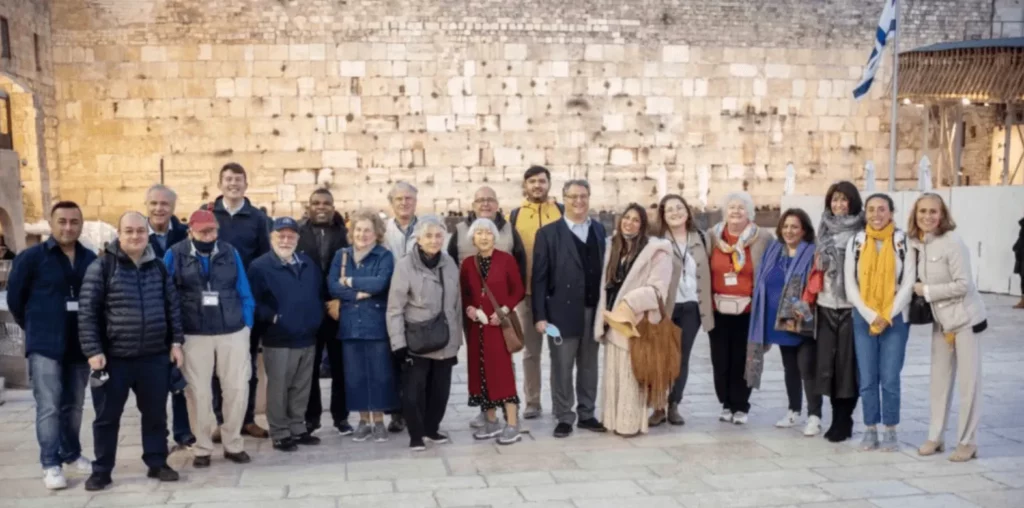
Jewish Identity and History at ANU Museum
The group enjoyed a guided tour at the ANU Museum of the Jewish People, led by Tzvika. He provided a comprehensive introduction, explaining that ANU is the largest Jewish museum in the world, with three floors and nearly 700 exhibits. The museum, which replaced the former Diaspora Museum (Bet Hatfutsot) , presents a modern, inclusive, and pluralistic perspective on Jewish identity and culture.
Tzvika guided the group through the museum’s different sections, starting on the third floor, which explores modern Jewish identity and the Jewish influence on global culture. He discussed key themes such as the diversity of Jewish communities, the evolving definition of Jewish identity, and the ways in which Jews have shaped fields like theatre, music, and cinema. Using examples from well-known figures, he illustrated the debate between universalism and distinct Jewish cultural contributions.
On the second floor, the group delved into Jewish history, from the First Temple era to the present. A powerful highlight was the discussion of the Spanish and Portuguese Inquisitions and the persistence of hidden Jewish communities. Tzvika shared moving stories, including that of a woman from Belmonte, Portugal, who continued the tradition of lighting Shabbat candles in secret, reflecting the resilience of Jewish identity over centuries.
The tour concluded with reflections on the importance of personal interpretation, with Tzvika emphasising that the museum’s goal is not to provide definitive answers but to encourage discussion and deeper understanding of Jewish heritage and identity. The group only saw a fraction of the exhibits so most have resolved to return.
BeeHero: Transforming Pollination for a Sustainable Future
The talk highlighted the critical role bees play in agriculture and the global food supply. Bees are responsible for pollinating 75% of the fruits, vegetables, and seed crops consumed worldwide, making them indispensable to food production. Despite their importance, bee populations are in steep decline due to factors such as pesticides, pollution, urbanisation, monoculture farming, and climate change. This has led to a global pollination crisis, which directly threatens food security.
Eytan, the speaker, detailed his background before joining BeeHero. Born in New York, he moved to Israel as a child and spent 15 years working for Tel Aviv City Hall, primarily in marketing and branding. During his career path Eytan has shown an incredible commitment to Hasbara. He won a television competition called The Ambassador which sought to look for an Israeli individual who could tell Israel’s story to a biased world. He also stood as an MK during his career path. Recognising the transformative impact of Tel Aviv’s high-tech startup scene—where one in ten people is employed in the sector—he decided to transition into the startup world. His goal was to contribute to a venture addressing a significant challenge for humanity. This led him to BeeHero, a company using advanced technology to improve pollination efficiency and combat the bee mortality crisis.
BeeHero, co-founded by three individuals, including a Technion alumnus, has developed a revolutionary sensor-based system that monitors hive health in real-time. These sensors, equipped with multiple data-collecting features, translate the bees’ behaviours into actionable insights for beekeepers. By preventing colony collapse and ensuring stronger hives, BeeHero not only supports beekeepers but also provides farmers with reliable pollination services. The company operates on a large scale, managing over 300,000 hives globally and preventing the loss of an estimated 1.2 billion bees.
The discussion also touched on the challenges of implementing new agricultural technologies, particularly in conservative industries where relationships and traditional practices hold significant value. However, with increasing bee mortality rates—reaching 70-80% in some cases—innovative solutions like BeeHero are becoming more crucial than ever in securing the future of global food production.
A Joyous Purim Celebration with Wonderful Hosts
We were warmly hosted by the brilliant David and Luise Grunberg, who welcomed us into their beautifully restored home. The evening was a vibrant celebration of Purim, filled with lively energy and adorned with colourful masks that added to the festive spirit. Adding to the atmosphere, the talented Noa Bodner captivated us with her performance, bringing the holiday’s traditions to life in a truly engaging way. It was a joyous occasion, marking the final event of the day, where everyone embraced the festive spirit in a truly memorable setting.
Last day
Closing remarks by Ida and Alan
As the trip concluded, Ida and Alan delivered heartfelt closing remarks, emphasising their deep appreciation for everyone’s participation and the importance of feedback in shaping future trips. Guests shared their highlights, from inspiring talks at the Technion to the emotional visit to Mount Herzl, with many reflecting on the warmth and gratitude received from locals, including IDF soldiers and startup CEOs. Alan spoke about his passion for bringing people to Israel and the resilience of its people, who continue to celebrate life despite ongoing challenges. Ida highlighted the generosity of many organisations that welcomed the group, contrasting it with an unexpected fee at the British ambassador’s residence. A journalist on the trip shared her enriching experience and commitment to supporting Israel, even after an e-scooter accident that gave her firsthand insight into the country’s excellent healthcare system. The group exchanged gratitude, praising the meticulous organisation and the meaningful itinerary, with the closing remarks capturing the essence of the journey—an emotional, inspiring, and unforgettable experience.
Interested in our next trip to Israel?
If you are interested in finding out about the next trip please email Ida:
Email: ida@technionuk.org

Private tour of the Peres Centre for Peace and Innovation
The group enjoyed a private tour of the Peres Centre for Peace and Innovation, expertly guided by Denis. The visit began with a short film on innovation, setting the stage for an exploration of the centre’s mission. Founded in 1996 by Shimon Peres, the centre initially focused on peacebuilding initiatives, bringing together Israelis and Palestinians, as well as Jews and Arabs, to collaborate on shared projects. Later, the innovation aspect was integrated, showcasing Israel’s technological advancements.
Denis introduced the group to an interactive exhibit featuring 22 Israeli innovators who shared their personal journeys, challenges, and insights. Among the highlighted figures were Itay Pincas, who developed 30 mobile apps by the age of 17, and Ruth Arnone, a scientist still working at the age of 91, co-developer of the multiple sclerosis drug Copaxone.
The tour continued with a visit to a replica of Shimon Peres’ office, where participants saw personal artefacts, including a collection of Ben-Gurion figurines, a replica of Peres’ Nobel Peace Prize, and a FIFA football award related to the centre’s peace project that unites children from different backgrounds through sport.
Denis also detailed the centre’s impactful peace initiatives, including “Saving Children,” which provides medical treatment for Palestinian children in Israeli hospitals, and “Training Doctors,” which equips Palestinian physicians with specialised medical training.
Innovation was a central theme throughout the visit. The group explored a timeline of Israel’s technological breakthroughs, learning about developments such as the PillCam, a miniature camera for medical diagnostics, and the Iron Dome missile defence system—both of which have ties to the Technion.
A highlight was the interactive game room, where participants competed in a quiz on Israeli innovation. The winners, much to their delight, were announced at the end.
The experience concluded with a futuristic virtual reality session, exploring potential innovations of the next 20 years, including 3D-printed food, space travel, and AI-driven solutions.
In the final segment, the group visited the Israeli Expo, where they explored current start-ups in fields such as medical technology, cybersecurity, and environmental sustainability. Innovations included an artificial cornea that eliminates the need for immunosuppressants and AI-powered drones capable of harvesting fruit.
Throughout the tour, Denis emphasised the centre’s dual mission: fostering peace through collaboration and driving technological innovation. The group left with a deeper appreciation for Israel’s contributions to global progress and the ongoing legacy of Shimon Peres.

